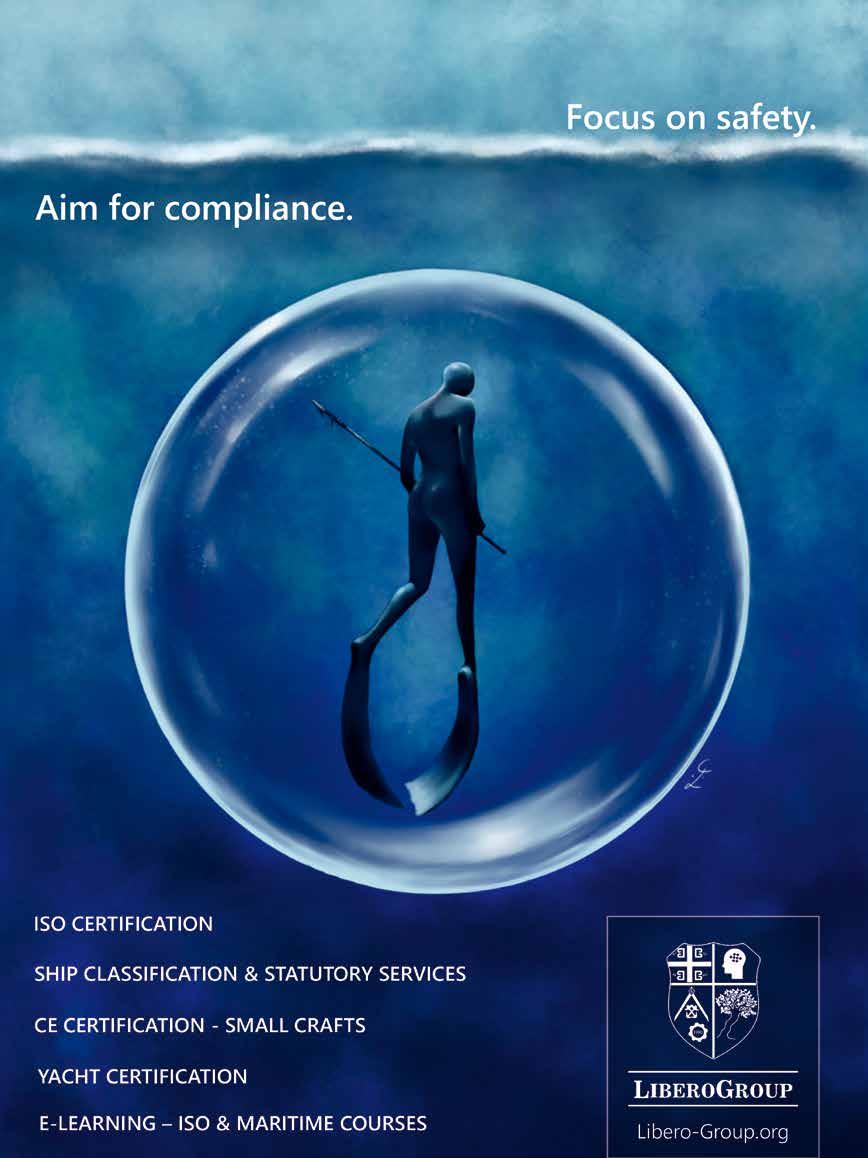Shaping Future Responsibility






Iliopoulos Director, ESG & Sustainability Services
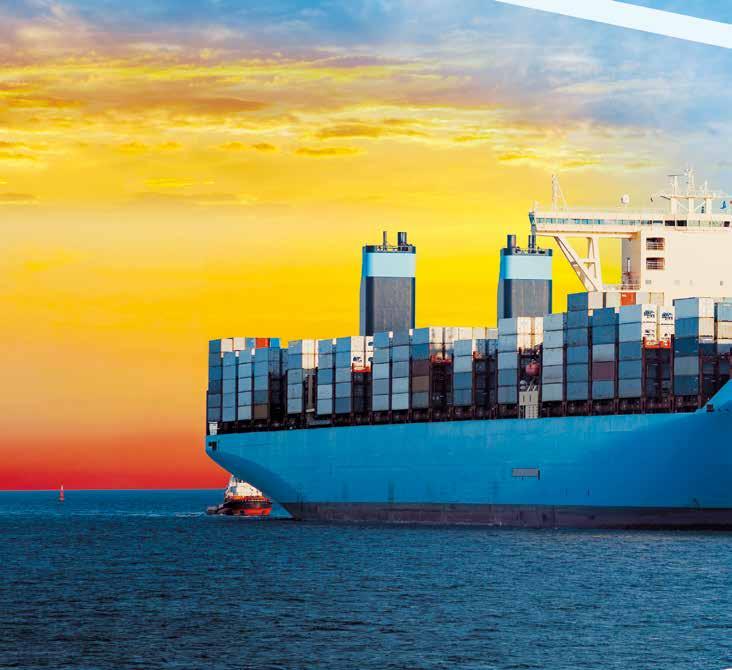
Shipping is a cornerstone of the global economy, carrying approximately 90 per cent of international trade, often with greater environmental efficiency than other modes of transport. However, the growing emphasis on sustainable development and responsible governance has made the integration of ESG (Environmental, Social, and Governance) criteria a strategic imperative. Adapting to new regulatory frameworks at both international and European levels, strengthening competitiveness, and ensuring the industry’s long-term viability have cemented ESG principles as an indispensable part of modern maritime strategy.

Historically, like many sectors, shipping has encountered numerous challenges related to sustainability, ranging from protecting the marine environment to reducing
greenhouse gas emissions, protecting biodiversity, and ensuring the health and safety of seafarers. In the past, however, the management of these issues was often less systematic. Today, as international require-
Sustainable development is not only a regulatory obligation but also a significant opportunity for the shipping industry.
ments continue to grow and investors, charterers, and financial institutions place increasing importance on ESG performance, companies in the industry are gradually adjusting to a new reality. Greek shipping, a global leader, has made significant progress in this direction, demonstrating that sustainable development is not only a regulatory obligation but also a strategic opportunity.
While shipping has long been focused on addressing environmental and social issues within the industry, today these concerns are being integrated in a more structured and strategic manner, defining the present and shaping the future of the sector.
A key factor highlighted by international sustainability reporting standards (ESRS) is the shipping industry’s integral position within the value chains of nearly all companies worldwide, underscoring its vital role in global sustainable development. Shipping facilitates the transportation of goods across virtually every sector of the economy, from energy and industry to technology and consumer goods sectors. Yet, the industry faces a range of complex challenges: managing greenhouse gas emissions, shifting to alternative fuels, handling waste, protecting biodiversity, and ensuring the health, safety, and
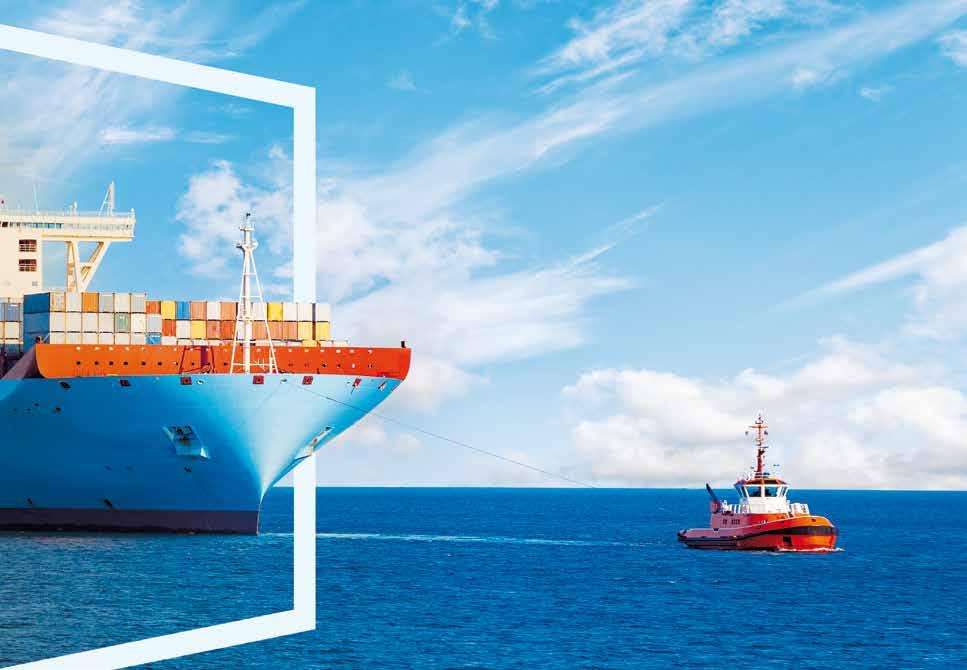
well-being of seafarers. In today’s maritime landscape, enhancing corporate governance, promoting transparency, integrating responsible business practices, and securing fair labour conditions have become key pillars of ESG strategies for shipping companies.
The shipping industry is characterized by a high degree of self-regulation, enabling the development of sustainable practices, though these were often implemented in a fragmented way. For example, in the past, environmental responsibility primarily focused on technical improvements, such as increasing the energy efficiency of ships and using exhaust gas filters. The lack of a unified framework for assessing ESG performance made it challenging to systematically measure, compare, and assess progress in sustainability.
The regulatory landscape has shifted significantly. The adoption
of international standards such as the GRI Standards, SASB Standards, and ESRS (European Sustainability Reporting Standards) has established a clear reporting structure, making the environmental and so-
ΕSG rating agencies assess the sustainability performance of shipping companies, directly influencing their financial viability.
cial performance of shipping companies both measurable and comparable. Notably, the new European CSRD (Corporate Sustainability Reporting Directive), which took effect in 2024 across most European countries, requires thousands of European companies, including many shipping firms, to publish structured and verified ESG reports.
Additionally, the upcoming CSDDD (Corporate Sustainability Due Diligence Directive), expected to be implemented in the coming years, will introduce stricter corporate responsibility requirements, driving greater transparency and improved performance on issues related to environmental protection, climate change mitigation, and human rights.
The International Maritime Organization (IMO) has set ambitious targets for the decarbonization of the shipping industry. Under the 2023 IMO GHG Strategy, total greenhouse gas emissions from international shipping are expected to be reduced by at least 20 per cent by 2030 (compared to 2008 levels), with the ultimate goal of fully decarbonizing the industry by 2050, in alignment with the Paris Agreement targets.
At the same time, the inclusion of shipping in the European Trad-
ing Scheme (ETS) and the implementation of the MRV (Monitoring, Reporting, Verification) system have introduced stricter CO2 emissions controls, requiring greater transparency in reporting.
These measures are driving the adoption of alternative fuels such as ammonia, hydrogen, methanol and biofuels, while carbon capture and storage (CCS) technologies are also being explored. Additionally, the FuelEU Maritime regulation, set to take full effect on January 1, 2025, actively supports the transition to more sustainable maritime transport. By gradually increasing the use of renewable and low-carbon fuels, it aims to reduce greenhouse gas emissions and mitigate climate change. Meanwhile, initiatives such as the Poseidon Principles and the Sea Cargo Charter provide a standardized framework
The shipping industry is characterized by a high degree of self-regulation, enabling the development of sustainable practices, though these were often implemented in a fragmented way. Continue
An increasing number of shipping companies are investing in alternative fuels, while the development of CCS systems offers a promising avenue for reducing CO2 emissions.

for incorporating ESG criteria into ship financing and chartering, reinforcing sustainability commitments across the industry.
Beyond regulatory compliance, integrating ESG criteria into the business strategy of shipping companies delivers significant benefits,
The future belongs to those who adapt and innovate, and Greek shipping is proving that it not only follows trends but actively shapes them.
strengthening competitiveness and ensuring long-term sustainability.
In recent years, investors and financial institutions have increasingly favored businesses committed to sustainable practices, making ESG performance a critical factor in the decision-making of banks, rating agencies, and charterers.
At the same time, the growing link between shipping and sustainable finance is creating new oppor-
tunities through green bonds and financial instruments that reward companies for reducing their carbon footprint. Meanwhile, ESG rating agencies, which now play a pivotal role in global markets, assess the sustainability performance of shipping companies, directly influencing their reputation and financial viability.
In this context, one of the most notable recent changes is the shift from a communication-focused approach to sustainable development to a more substantial and measurable strategy. ESG/Sustainable Development Reports are no longer just tools for corporate communication; they are now grounded in international standards, concentrating on material issues and providing well-supported data on companies’ performance in environmental, social, and governance aspects.
It is now clear that sustainable development is not only a regulatory obligation but also a significant opportunity for the shipping indus-
try. The next phase of sustainable shipping involves fully integrating innovative solutions that will accelerate the energy transition and make a substantial contribution to decarbonization. An increasing number of shipping companies are investing in alternative fuels, while
Τhe growing link between shipping and sustainable finance is creating new opportunities through green bonds and financial instruments.
the development of CCS systems offers a promising avenue for reducing CO2 emissions.
The improvement of seafarers’ welfare has also become a central focus. New protocols for crew safety and health, the promotion of equal opportunities, and enhancement of psychological support for seafarers are now key priorities.
Greek shipping companies have already made significant progress
in this area, clearly demonstrating their commitment to sustainable development.
As a traditional global leader, Greek shipping has proven its ability to adapt and its strategic vision to lead this transition. The best practices being adopted within the maritime community today demonstrate that sustainable development is not only achievable, but also measurable and profitable.
The future belongs to those who adapt and innovate, and Greek shipping is proving that it not only follows trends but actively shapes them. The ongoing adoption of these practices shows that sustainable development can drive positive change, impacting the environment, society, and the long-term profitability of businesses. The shift to sustainable shipping is not just a challenge. It presents a unique opportunity to build a more resilient, innovative, and competitive industry - one that is capable of maintaining its global leadership in the years to come.
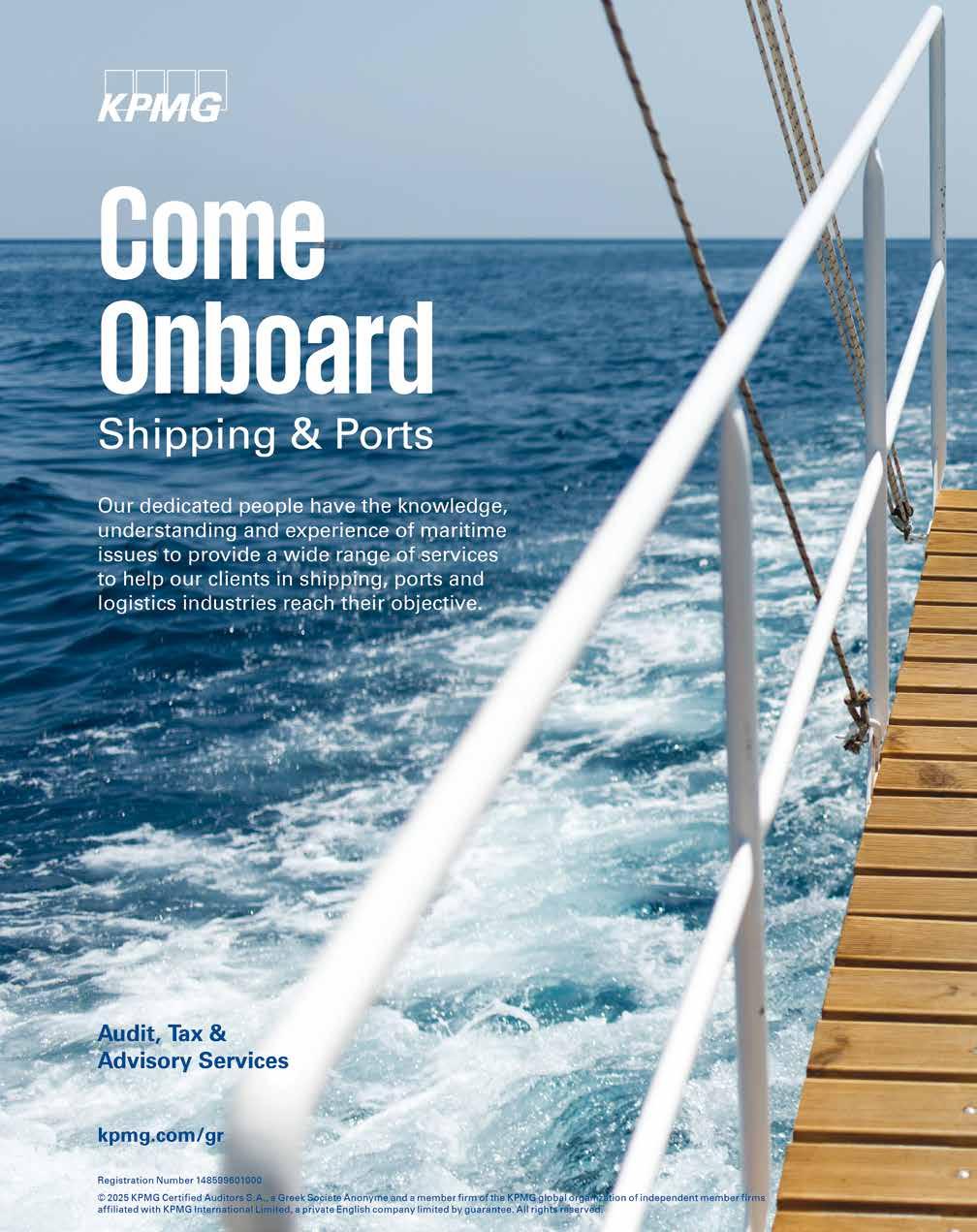
SUPPORTED BY ESG SHIPPING AWARDS INTERNATIONAL
MANAGEMENT

Artemios Alifragkis Head of ESG

Shipping operates in a volatile environment with unpredictable factors and will require coordinated sustainable actions and options to help reduce global emissions, says Artemios Alifragkis, Head of ESG, Atlantic Bulk Carriers Management Ltd. He highlights that the modern design of the company's fleet helps mitigate environmental risks by adopting greener technologies, while noting that the highest standards of corporate governance are adhered to guide its decisions and actions, reducing risks aligned with its long-term growth. It points out that the company is committed to serving the shipping industry with the utmost respect for its seafarers and employees, the environment, and society, while underlining that Atlantic Bulk Carriers Management's nomination at the ESG Shipping Awards International, and the award in the "Industry Partnership Leader" category, is a testament to its continued investment in practices of incorporating new ideas in its sustainability journey.
Should regulations governing the transition of shipping to a sustainable future have global applicability to ensure fair competition and consistency?
The shipping industry operates in a volatile environment with innumerous unforeseen factors affecting its operational efficiency. At the same time, it pioneers in creating procedures and mechanisms that ensure the viability of its stakeholders. From an operational point of view, we can say that shipping is a global industry whose activities directly and indirectly affect the transactional scheme of competition. Especially in the shipping sector, consistency in standards is a critical topic that safeguards the competition among peers, giving the privilege to companies to plan and invest in a series of long-term sustainable practices. We need to bear in mind that, shipping contributes to global emissions and consequently to the climate change itself. For this reason, coordinated actions are more than mandatory, not only for meeting the Paris Agreement’s requirements but mostly to serve as a base of thinking for a collective progress initiative. Historically, the transitions were sourcing all kind of the industry's strengths, weaknesses, opportunities and threats, resulting to the creation of a strategy on how to be more adaptable according to the time addressed to. Since we are having a market integration, viable and sustainable options will push shipping companies to invest in
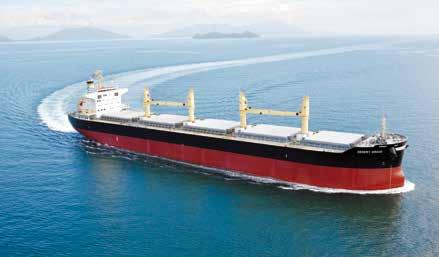
"Our company’s principles cover a wide range of on-going procedures and mechanisms proving our commitment to a better future for the generations to come and the industry we serve".
new technologies, processes as well as to a creation of global green economy, gradually.
What inspired your company to embed ESG principles into its core operations and how do these align with your long-term business goals?
Our company is dedicated in serving the shipping industry with the outmost respect towards our seafarers and employees, the environment, the society we are living in, and the business we are serving. It is stated on our corporate mission. Atlantic Bulk Carriers Management is a leading company with a long experience in providing reliable and efficient transportation services around the world. Our company’s principles cover a wide range of on-going procedures and mechanisms, which we continuously advance in all three pillars of ESG, proving our commitment to a better future for the generations to come and the industry we serve.
Our ongoing procedures include our environmental responsibility, where we proudly have applied bow design changes since the 1990s, at a time when fuel and emission reduction were not a “hot” topic. Our modern fleet design contributes to mitigating the environmental risks by adopting greener technologies. On the same mode, our social engagement is strong enough, advancing the wellbeing of our seafarers and employee through a series of initiatives, improving their daily activities, while at the same time giving back to the society we are living in, through targeted initiatives. We are committed to upholding the highest standards of corporate governance to guide our company’s decisions and actions, mitigating risk that align with our long-term growth and vision.
How does your company’s award-winning action reflect its overall commitment to innovation and sustainability and what does this mean for the future of your ESG strategy?
Atlantic Bulk Carriers Management is a leading shipping company recognizing its responsibility in contributing to a more sustainable future for the generations to come. It is not the first time that our company contributes to innovations, to Academia, regulations and to the society with business expertise and its know-how, reflecting through this way to a broader ESG commitment. Our nomination to 2024 ESG Shipping Awards International, and our awarding in the “Industry Partnership Leader” category, is a proof of our continuous investment in practices and integrated new ideas on the sustainability journey. This recognition goes initially to our people and those who believe and support progress and change for a better future. We lead by example, in an era where shipping is on a critical path, considering the global challenges in line with adaptation of cleaner technologies, reducing waste and examining options for renewable energy solutions.
Our commitment to innovation and sustainability counts many decades before the introduction of ESG in shipping, back in the 1990s where emissions and fuels reduction were not a “hot” topic at all, implementing techniques that ensure a more viable and sustainable operational scheme across our fleet.
Our company’s continuous improvement defining o our clear mission and vision are the ethical compass on our sustainability journey, and a driver for empowering our ESG strategy across our value chain.
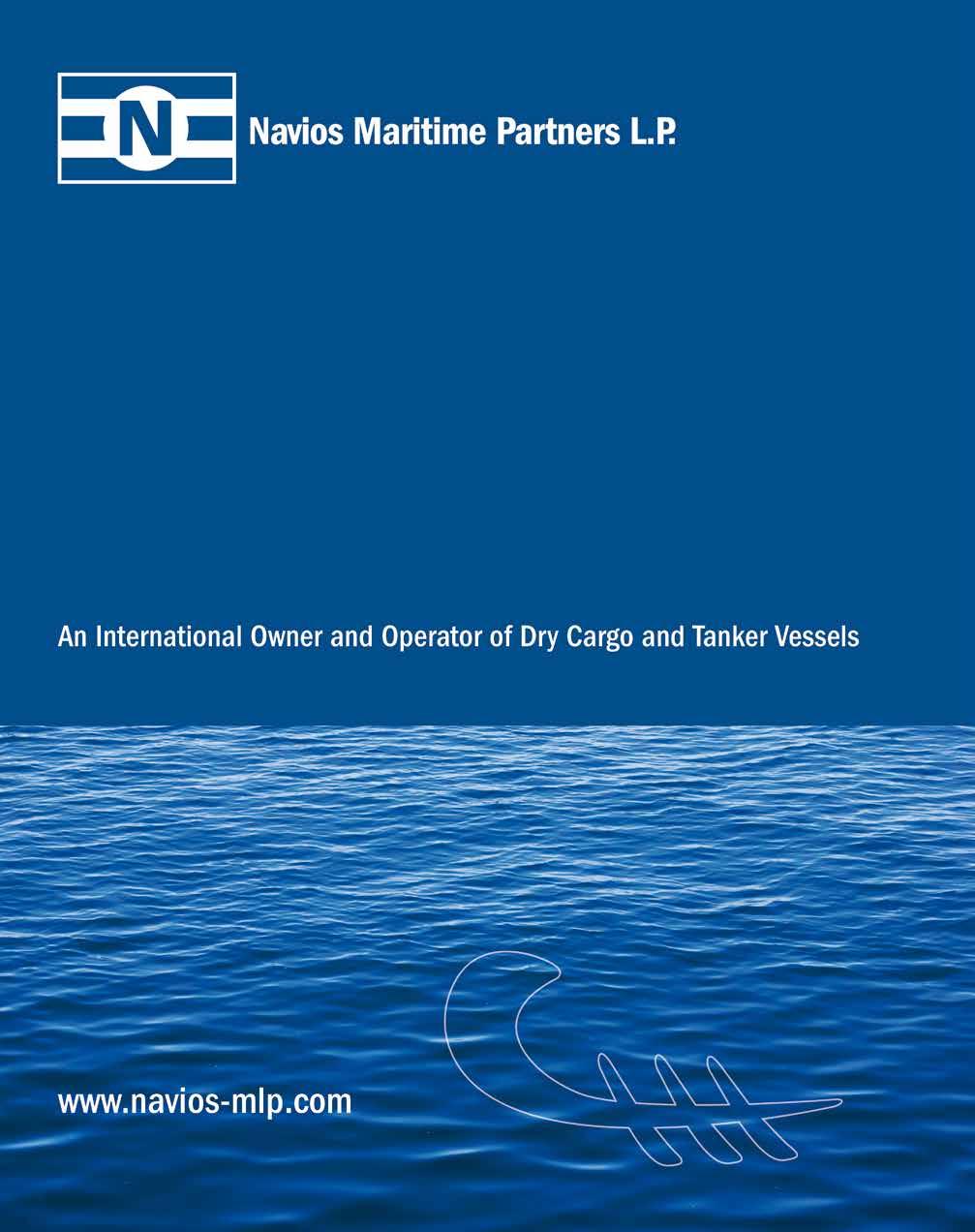
BERGE BULK



erge Bulk is leading the way toward decarbonizing the shipping industry, despite the high costs associated with transitioning to alternative green fuels, which require substantial investment in new assets. Paolo Tonon, Technical Director at Berge Bulk, emphasized the financial challenges, noting that costs in the dry bulk sector are expected to rise by up to 75 per cent by 2050. Michael Blanding, Head of Sustainability, highlighted Berge Bulk’s commitment to a zero-carbon future, showcasing innovations like the wind-assisted Berge Olympus, which integrates sustainability with operational excellence and sets a benchmark for the industry’s sustainable transformation. Berge Olympus sparks industry-wide change by proving that innovative solutions deliver both environmental and operational benefits, setting a new standard for sustainable shipping.
To what extent does the cost of transitioning to sustainable shipping impact profitability within the shipping sector?
Paolo Tonon: Decarbonizing the shipping industry comes at a high cost. Transitioning to alternative green fuels requires substantial investment in new assets, and these fuels are considerably more expensive than conventional HFO or MGO. According to the IMO’s decarbonization strategy, the total cost per transport work (USD/ DWT-nm) in the dry bulk sector is expected to rise by up to 20 pct by 2030, 65 pct by 2040, and 75 pct by 2050. This presents a major financial challenge for both shipowners and fleet managers. To navigate this shift, the industry must explore new business models that fairly distribute costs across the supply chain.
What inspired your company to embed ESG principles into its core operations and how do these align with your long-term business goals?
Michael Blanding: At Berge Bulk, ESG principles are integral to our vision of «leading the world to a zero carbon future through safe, efficient, and sustainable shipping». Inspired by the urgent need to address climate change and safeguard marine ecosystems, Berge Bulk embed sustainability into every aspect of our operations. Our Maritime Marshall Plan drives innovation, from equipping vessels like Berge Olympus with windassisted propulsion systems to supporting reforestation with our commitment to plant 25 million trees. These efforts align with a long-term goal to achieve zero scope-1 emissions fleetwide by 2050,

underscoring our commitment to operational excellence and environmental stewardship.
What sets your award-winning initiative apart as a model for the maritime industry and how do you envision its success inspiring similar efforts across the sector?
Paolo Tonon: Berge Olympus is a breakthrough in sustainable shipping, equipped with BAR Technologies’ WindWings and a 1MW shaft generator system. These technologies significantly reduce emissions and improve fuel efficiency, demonstrating that sustainability and operational excellence can go hand in hand. As the world’s most powerful sailing cargo ship, Berge Olympus exemplifies how wind-assisted propulsion can be effectively integrated into modern bulk shipping.
This initiative stands out for its scalability and real-world application. Operating on major trade routes, such as ChinaBrazil, Berge Olympus shows the feasibility of harnessing wind power in commercial shipping, inspiring others to explore similar
innovations. It reflects Berge Bulk’s commitment to the Maritime Marshall Plan, which focuses on decarbonizing shipping through technology, collaboration, and sustainable practices. Beyond the technology, the success of Berge Olympus lies in its ability to spark industrywide change. By proving that innovative solutions can deliver both environmental and operational benefits, it sets a benchmark for others in the maritime sector.
Berge Bulk’s leadership in this initiative encourages stakeholders to collaborate and invest in technologies that contribute to a zero carbon future.
Berge Olympus is not just a vessel; it is a symbol of what is possible when ambition meets innovation, inspiring the industry to embrace sustainable transformation for the future of global trade.
As the world faces unprecedented shifts driven by technology, climate change, and social transformation, ports are emerging as key players in the global economy. They connect markets, support supply chains, and shape the dynamics of international trade. At the center of this evolution, the Port of Piraeus is charting its course for a sustainable future.
AS THE OPERATOR of Greece’s largest port, PPA S.A. goes beyond operational efficiency, placing a strategic emphasis on sustainable development. Positioned as a gateway to three continents, Piraeus faces the dual challenge of maintaining its economic vitality while prioritizing environmental responsibility, social equity, and corporate governance.
Investing in a modern and resilient port
2024 marked another significant milestone for PPA S.A., as the company continued to expand across every sector. This growth is not merely reflected in financial performance but also in strategic investments, infrastructure enhancements, and service upgrades that elevate the port’s global standing. With a robust foundation in place, PPA S.A. consistently integrates environmental and social goals into its corporate strategy. The company has published its Sustainability Report for six consecutive years, tracking performance and maintaining transparent standards. This commitment to accountability ensures the long-term effectiveness of its initiatives and a commitment to high compliance standards.
PPA S.A. is increasingly recognized for its leadership in sustainability. For the third consecutive year, it was named one of the most sustainable companies in Greece by the QualityNet Foundation. In addition, the company received five top
The operator of Greece’s largest port consistently integrates environmental and social goals into its corporate strategy

PPA S.A. has built a comprehensive governance structure that ensures transparency and compliance with international standards. Through targeted policies, the company enhances its corporate responsibility while supporting the local community through impactful social initiatives. A core focus is creating a safe, fair, and inclusive workplace. PPA S.A. invests in employee development, offering ongoing training that promotes professional growth and ensures a safe working environment. It also maintains a strict zero-tolerance policy against corruption, reinforcing its commitment to integrity.
Socially, PPA S.A. actively supports vulnerable groups, collaborates with local organizations, and fosters the cultural and educational development of the surrounding community. The company’s social responsibility efforts span education, healthcare, sports, and culture, helping to build a stronger, more cohesive society.
For PPA S.A., sustainability is not just a business strategy-it is the foundation of its future growth. The company’s initiatives extend far beyond regulatory compliance, aiming to create a resilient and innovative port that can meet the challenges of the decades to come.
accolades at the Environmental Awards 2024, lauded for its contributions to the circular economy, waste management, and sustainable port infrastructure. Furthermore, at the Compliance Awards 2024, PPA S.A. was honored for its regulatory compliance and transparency policies.
Notably, PPA S.A. is among the first companies included in the ATHEX ESG Index of the Athens Stock Exchange, which tracks the performance of companies excelling in environmental, social, and governance (ESG) practices.
This inclusion underscores the company’s unwavering
commitment to long-term sustainability and transparent operations.
At the heart of PPA S.A.’s strategy is a focus on reducing its carbon footprint and promoting clean energy solutions. The company participates in transformative projects such as EALING, which involves the electrification of berthed ships, significantly cutting down on air pollution. The CIPORT project continues these efforts, focusing on energy efficiency in cruise ships.
Additionally, PPA S.A. is spear-
heading the development of LNG refueling infrastructure, helping the maritime industry transition to eco-friendly fuels. Under the POSEIDON MED II program, the company has conducted comprehensive safety and risk assessment studies for LNG ship refueling operations at Piraeus.
These initiatives align with European emission reduction policies, reinforcing the port’s role as a leader in green development. PPA S.A. is also advancing its energy systems by optimizing energy consumption and integrating renewable energy sources across its operations.
As Piraeus evolves into a global trade hub, it does so with a commitment to environmental stewardship, social progress, and effective governance. Through coordinated efforts, strategic investments, and cutting-edge technological innovation, PPA S.A. is setting the stage for the Port of Piraeus to serve as a model of sustainable growth-not only for Greece but for all of Europe. With a clear vision and forward-thinking planning, PPA S.A. is building a port that is economically robust, environmentally conscious, and socially responsible-a port that seamlessly integrates business excellence with sustainability, delivering longterm value for both current and future generations.
For PPA S.A., sustainability is not just a business strategy-it is the foundation of its future growth.
SCHULTE SHIPMANAGEMENT

ESG Superintendent

The rising cost of conventional fuels and the measures envisaged by international organizations provide further incentives for investment in efficient alternative fuel technologies in shipping and carbon reduction strategies, says Stathis Theofilou, CSR Inspector at Bernhard Schulte Shipmanagement. Theofilou says geopolitical tensions, conflicts and trade protectionism are pushing the shipping industry to adopt ESG goals by accelerating the transition to cleaner energy sources such as LNG and hydrogen to reduce dependence on volatile fossil fuel markets. He also stresses that the company’s priorities for 2025 remain its programmes to attract more female seafarers, and its diversity, equality and inclusion initiatives. «We are proud to have increased the number of female seafarers by 34 per cent in the last two years, and in the last two years and to have included employees from 13 new nationalities. BSM has been involved in the Diversity@Sea initiative to attract more women into the seafaring professions, with pilot vessels with diverse crews and regular feedback on working conditions», he said.
Do you think that conflicts, geopolitical tensions and the increasing trade protectionism promote ESG objectives in the maritime industry?
Geopolitical tensions, conflicts, and trade protectionism push the maritime industry to adopt ESG objectives by accelerating the transition to cleaner energy sources, such as LNG and hydrogen, to reduce dependence on volatile fossil fuel markets. Supply chain disruptions encourage companies to diversify trade routes and adopt ethical labour practices to ensure compliance with international standards. Stricter environmental and social regulations, driven by geopolitical risks, oblige shipping companies to improve governance frameworks and transparency. Rising fuel costs and sanctions further incentivize investment in fuel-efficient technologies and carbon reduction strategies. Also, protectionist measures promote regionalization and green investment opportunities, such as sustainable port infrastructure and nearshoring trends. These challenges ultimately drive the industry towards more sustainable and responsible operations.
What inspired your company to embed ESG principles into its core operations and how do these align with your long-term business goals?
BSM integrates ESG principles to enhance business sustainability and growth through diversity, equity,

and inclusion. Recognizing the value of diverse perspectives, we offer digital trainings like Remote Work Management and Cross-Cultural Training, along with interactive Fleet Leaders’ Meetings to improve team cohesion and productivity.
Our Cross-Company Mentorship Programme, a DSG initiative, fosters a diverse leadership pipeline by connecting high-potential employees, especially women and underrepresented individuals, with external mentors. This programme aims to break advancement barriers and ensure leadership diversity.
We developed the Predictive Index (PI) tool, launching in 2025, to support unbiased hiring with data-driven insights into candidates’ traits, promoting equitable hiring aligned with our ESG commitment.
In 2025, our DEI priorities include the Sea-Shore Programme to attract women seafarers, anti-harassment and mental health training, and a real-time DEI progress dashboard. These initiatives align our ESG efforts with sustainable growth, employee well-being, and organizational resilience.
Can you share the key highlights of your award-winning initiative and how it demonstrates leadership within the maritime industry?
On May 20, 2024, BSM received the ESG Leader Award for Diversity, Equity, and Inclusion at the first international ESG Shipping Awards in Athens.
BSM is committed to fostering an equitable and inclusive culture, ensuring diverse representation at all levels. Over 1,000 employees
have completed DEI training through various programmes. In 2023, two female leaders joined our management board, increasing female representation in managerial positions to 31 per cent.
We are proud of the 34 per cent increase in female seafarers over the past two years and the inclusion of employees from 13 new nationalities. BSM participated in the Diversity@Sea initiative to attract more women to seafaring professions, with pilot vessels featuring diverse crews and regular feedback on working conditions.
In early 2024, BSM launched a female mentorship programme to support women seafarers facing unique challenges. This programme will extend to male cadets in summer 2024, providing shore-based mentors to enhance their sense of belonging and address onboard issues.
BSM’s Smart Academy programme collaborates with maritime universities to bridge the gap between academic knowledge and practical training, promoting equal opportunities.




he ongoing international conflicts and the geopolitical tensions are greatly affecting global trade. These conditions along with the natural and environmental risks associated with climate change challenge ESG objectives in the maritime industry. According to Dimitra Kakavogianni, Human Resources Director, Chandris (Helllas) Inc., «with strong commitment to a sustainable future, capacity for business resilience and flexibility and drive towards excellence, we employ a comprehensive strategy that aims to promote ESG objectives in our sector». In May 2024, Chandris (Hellas) Inc. and Century Bulk Carriers Management were honoured with the Silver Social Leader Award at the ESG Shipping Awards International. «The recognition received in this competition, which is the second in the last two consecutive years, marks our continuous commitment to promoting the welfare of our people, improving our social impact and making our business resilient», Dimitra Kakavogianni underlines.
Do you think that conflicts, geopolitical tensions and the increasing trade protectionism promote ESG objectives in the maritime industry?
Adapting to an ever-evolving world is the key for the maritime industry. The ongoing international conflicts and the geopolitical tensions are greatly affecting global trade. Apart from the displacement of millions of refugees worldwide, these conflicts lead to shipping disruptions, the closing of ports and access limitations to vital regions, while the risk to the safety of crews involved in these areas is increasing. The disruptions in the supply chain and the infrastructure destruction result in logistical complications and price fluctuations that have a significant impact on the industry. These conditions, along with the natural and environmental risks associated with climate change, challenge ESG objectives in the maritime industry. With strong commitment to a sustainable future, capacity for business resilience and flexibility and drive towards excellence, we employ a comprehensive strategy that aims to promote ESG objectives in our sector.
In your view, what role does the maritime industry as a whole play in addressing global ESG challenges and how can industry-wide collaboration drive meaningful progress?
The maritime industry plays a crucial role in tackling global ESG challenges. And while significant progress has been made in addressing environmental and energy efficiency issues, the social and governance dimensions in ESG remain

a great challenge for the industry. From a social perspective, focusing on the human element and improving employee well-being, both at sea and on shore, are key issues for the sector. Advanced HR practices that prioritize health and safety, work-life balance, and employee engagement become increasingly important. Flexible work arrangements, access to mental health support, investment in training and development programs are only some of the initiatives that effectively support employees and help them grow and feel valued. In this journey, collaboration across maritime HR professionals and the use of technology, including AI and data analytics, can act as facilitators. In addition to the above, the industry can positively contribute to local communities by participating in outreach initiatives, encouraging employee volunteerism, supporting educational programs for young individuals and promoting best practices which strengthen community relationships and create a long-lasting positive impact on society.
Can you share the key highlights of your award-winning initiative and how it demonstrates leadership within the maritime industry?
In May 2024, we were honoured with the Silver Social Leader Award at the ESG Shipping Awards International. The recognition received in this competition, which is the second in the last two consecutive years, marks our continuous commitment to promoting the welfare of our people, improving our social impact and making our business resilient. Our “S” story includes three award-winning initiatives: an extensive well-being program for our employees both at sea and on shore, a well-structured learning and development program for our seafarers and office personnel, and community contributions. We proudly share some of the key highlights which give us a competitive advantage in the maritime industry
and propel our company forward. Dedicated to promoting occupational health and safety, we appointed a doctor in the position of Human Relations Director, who is responsible for addressing various issues, especially the ones related to mental health and employee relations. In addition to his preventive role, our Human Relations Director handles loss management, arbitration, and harassment cases. Through timely and effective interventions, the doctor ensures the wellbeing of our employees and the smooth resumption of operations, while reinforcing a supportive and resilient work environment. Towards this direction, Health & Safety Campaigns, relevant webinars and training, and daily provision of healthy and nutritious meals in our in-house restaurant also take place. Employee benefits include medical and life insurance plans, additional medical examinations for traveling personnel, gift cards, food vouchers, gym pass, parking facilities, discounts and special offers, team bonding activities both indoors and outdoors, get-together events for employees and their families. We foster career growth and advancement through performance management, and promote diversity, equity and inclusion, aiming to increase the number of women in our workforce. The company values professional development and provides continuous training opportunities to its people, including reskilling and upskilling, soft skills and leadership skills training. At the same time, we encourage young talents to join the maritime industry providing youth educational programs and internships. These practices along with the long-lasting support of the local communities through our participation in the Union of Greek Shipowners, corporate blood bank, volunteer activities and charitable initiatives demonstrate our strategic positioning in the maritime industry and our commitment to ESG objectives and targets.
PCT S.A. (Piraeus Container Terminal) develops and manages the facilities of Piers II and III of the Port of Piraeus providing loading/ unloading and storage services for imported and exported, including cargoes that use Piraeus only as a transit station (transshipment cargoes).
THROUGH an extensive investment program exceeding € 600 million, PCT has established the container terminal of Piraeus as the leading port in the Mediterranean and amongst the top four in Europe.
Energy Efficiency and Green Infrastructure
PCT places great emphasis on the use of energy resources, demonstrating its commitment to environmental responsibility and sustainability. The Company has implemented a comprehensive strategy to optimize energy efficiency throughout its operation by investing extensively in the development of its infrastructure and mechanical equipment with the aim of improving sustainability indicators, production capacity, increasing the automation of specific processes and, ultimately, the provision of high-quality services.
Today PCT has a fully electric fleet of 30 Quays Cranes (QC) and 22 Rail-Mounted Gantry (RMG) Cranes, as well as 45 Electrified Rubber-Tyred Gantry (eRTG) Cranes. This has significantly reduced the carbon footprint of the terminal and proactively advances the transition towards a "green port".
The Company enhanced its
energy management with a telemetry project that monitors both port equipment and building facilities. Launched in 2022, this initiative provides real-time electricity consumption data, linking energy use to machine productivity and aiding in malfunction detection to reduce maintenance costs. Expanded in 2023 to include building facilities, this project now offers a comprehensive view of energy efficiency across the terminal, significantly advancing PCT's sustainability and operational effectiveness.
Over the years, PCT has been actively pursuing the modernisation and upgrading of its op-
Τhe Company enhanced its energy management with a telemetry project that monitors both port equipment and building facilities.
erational equipment and facilities while reducing fuel use. In terms of equipment, the Company plans within the year, to procure 10 fully electric tractors for the gradual strengthening of the fleet with more environmentally friendly vehicles.
To continuously improve energy efficiency and overall carbon footprint reduction, PCT has prioritised the connection of its facilities with the High Voltage grid, with a plan to invest € 9 million for the construction of a High Voltage Substation to provide for the On-shore Power Supply (OPS) of vessels.
This entire project, expected to reach € 48 million, reinforces the organisation's commitment to provide the best and most ef-
ficient services to its customers, in a sustainable and responsible manner.
PCT's approach to climate change risks involves a comprehensive assessment of potential impacts, such as extreme weather conditions and natural disasters such as earthquakes, and the development of strategies to mitigate them. This includes a weather station that has been established in cooperation with the National Observatory of Athens since 2017, which provides alerts to the operations portal.
In response to the intensifying effects of climate change, PCT strengthened its mitigation strategies in 2024 by launching a new project dedicated to the advanced monitoring of local weather conditions across its operations. The project includes the installation of 22 weather stations in several operational areas through which the weather conditions can be monitored in real time and weather forecast of high accuracy provided via AI technology.
The ever-expanding utilisation of Information Technology (IT) and Communication Technologies in PCT is a catalytic factor in the continuous improvement of its operation. In cooperation with PCT Process Excellence Department, PCT IT Department integrates automated and digitised applications into the Company's operating model, simplifying and speeding up processes, further enhancing worker safety, securing transactions and reducing costs and the port's en-
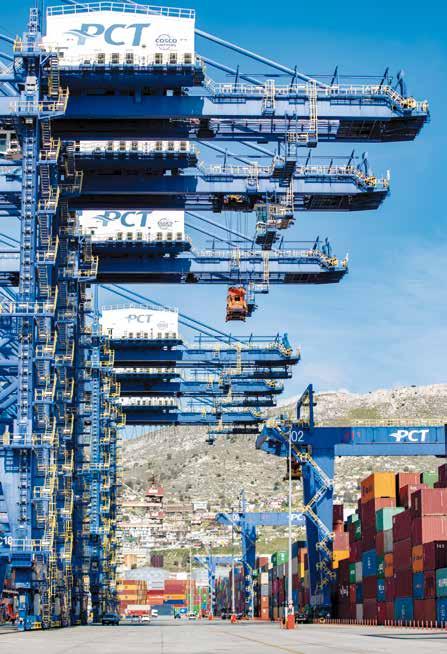
vironmental footprint.
Since 2010, PCT has developed and is constantly upgrading the central Terminal Operating System - TOS with the main objectives of optimizing procedures by maximizing the utilization and performance of available resources as well as the safe operation of the port. New features are added to the TOS from time to time to meet specific business needs. Such is the reduction of the distances traveled by a truck as well as real-time information on the condition of internal trucks in order to prevent or restore technical issues, to refuel in time and to control the safe movement of vehicles at work sites.
At the same time, PCT HPCS is an electronic platform designed and developed entirely by PCT's IT Department, which interconnects multiple IT systems that collectively comprise the port community. By digitizing the PCT services provided to all
stakeholders, the Company has increased processing speed, immediate exchange of information (exports, imports, uploads, consolidations, dangerous goods and other statistics), minimizing paperwork errors and increased security of transactions. The PCT HPCS plays an important role in promoting sustainable business practices and effective governance through improved operational transparency and efficiency.
By focusing on the pillars of social care, education, sports and environment, the Company has implemented remarkable programs to support educational and charitable institutions, non-profit organizations and vulnerable groups. Since 2010 and with this year’s contributions, the total amount of social responsibility actions is expected to exceed € 850.000.
PCT has been actively pursuing the modernisation and upgrading of its operational equipment and facilities while reducing fuel use.

Gregory Spourdalakis Managing Director
Geopolitical tensions and trade protectionism often hinder operational optimization in the shipping industry, leading to higher fuel consumption and emissions. However, through a partnership with OneLink, Columbia Group mitigates these challenges by leveraging advanced digital tools, IoT sensors, and machine learning. According to Gregory Spourdalakis, Managing Director of Columbia Shipmanagement, these technologies enhance vessel performance, optimize fuel use, and ensure regulatory compliance. By embracing technology-driven solutions like EmissionLink and EngineLink, Columbia Group is enabling shipowners to reduce their environmental impact and improve operational efficiency while remaining competitive in a rapidly changing industry focused on decarbonization and emissions reduction. Οn the occasion of ESG Shipping Awards, Mr. Spourdalakis noted that Columbia Group is proud to have earned the bronze Diversity, Equity, and Inclusion Leader Award for its Female Cadet Mentorship Programme and the bronze Technology Leader Award for its Performance Optimisation Control Room (POCR). «Columbia Group's commitment to ESG is further demonstrated through achievements like zero oil spills in 2024 and ongoing sustainability initiatives», he added.
Do you think that conflicts, geopolitical tensions and the increasing trade protectionism promote ESG objectives in the maritime industry?
In principle, no. Geopolitical tensions and trade protectionism impose restrictions that prevent full operational optimisation. The inability to select the most efficient routes, call at the most convenient ports, or consolidate cargo movements often leads to increased fuel consumption, higher emissions, and inefficiencies that counteract ESG objectives.
However, through our preferred partner OneLink, of which our Performance Optimisation Control Room (POCR) is a member, we are able to mitigate these challenges. OneLink’s data-driven approach integrates advanced digital tools, machine learning, and IoT sensors to enhance vessel performance, optimise fuel consumption, and ensure regulatory compliance, even in restricted operating environments. With tools like EmissionLink and EngineLink, we can proactively track emissions, predict maintenance needs, and implement real-time route optimisation strategies.
While trade restrictions complicate sustainability efforts,
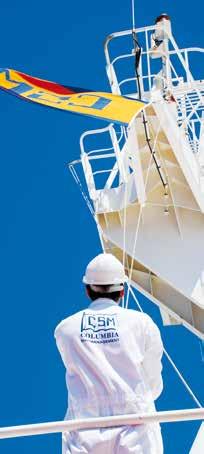
Columbia Group remains committed to pushing for acceleration in ESG progress through technology, digitalisation, and strategic partnerships. Our collaboration with OneLink allows us to transform these challenges into opportunities ensuring shipowners remain compliant, efficient, and competitive, despite external constraints.
What do you see as the biggest opportunities for driving sustainability in shipping and how is your company positioning itself to seize them?
The biggest opportunities for driving sustainability in shipping lie in technology-driven performance optimisation, regulatory compliance, and industry collaboration. The increasing global focus on decarbonisation and emissions reduction is not just a regulatory requirement but a competitive advantage for shipowners who proactively adopt sustainability measures.
At Columbia Group, we are seizing this opportunity by working with preferred partners such as OneLink to provide an integrated digital ecosystem that optimises vessel performance, tracks emissions, and ensures full compliance with regulations such as IMO-DCS,
MRV, EU ETS, FUEL EU and CII. By leveraging tools like EmissionLink and EngineLink, we help shipowners reduce their environmental footprint while improving operational efficiency.
Beyond digital innovation, we are also actively involved in shaping the future of alternative fuels and clean energy solutions. Columbia Shipmanagement, member of Columbia Group, is currently supervising the newbuilding process of dual-fuel vessels, ensuring these meet the highest standards of efficiency and sustainability. Additionally, we participate in pioneering industry projects such as NH3CRAFT, which explores ammonia as a viable marine fuel, and BlueBARGE, a groundbreaking initiative to develop offshore electrical power supply solutions for moored vessels. These projects reinforce our commitment to driving real, scalable solutions for decarbonisation.
By combining technological innovation, strategic partnerships, and a deep understanding of the maritime sector, Columbia Group is helping shipowners turn sustainability into an opportunity for long-term profitability and growth.
Can you share the key highlights of your award-winning initiative and how it demonstrates leadership within the maritime industry?
Columbia Group is proud to have won the bronze Diversity, Equity, and Inclusion Leader Award for our Female Cadet Mentorship Programme and the bronze Technology Leader Award for our Performance Optimisation Control Room (POCR) at the ESG Shipping Awards.
The Female Cadet Mentorship Programme promotes diversity and inclusion by pairing female cadets with trained mentors who provide guidance, support, and career development opportunities. This initiative has increased retention rates among female seafarers and strengthened our commitment to fostering equality and belonging across our fleets.
The POCR, recognised for its technology leadership, enabling realtime emissions tracking, weather routing, fuel optimisation, and engine assessments across 350+ vessels, helping shipowners meet decarbonisation goals.
Additionally, our annual ESG Report showcases achievements like zero oil spills in 2024, as well as our Single-Use Plastics Reduction Campaign, among others, reflecting our dedication to environmental and social responsibility.

The global maritime industry requires unified regulations to ensure fair competition and drive progress in both environmental and operational standards. In this context, Ms. Margarita Veniou, Chief Corporate Development, Governance & Communications Officer of Diana Shipping Inc., underlines that the International Maritime Organization (IMO) plays a pivotal role in creating consistent frameworks, ensuring sustainability, and preventing unfair competition. «Without global standards, fragmented regional policies can create compliance challenges». She added that Dianna Shipping sees sustainability as a strategic imperative, integrating Environmental, Social, and Governance (ESG) principles into its operations. Recognized at the 2024 ESG Shipping Awards with the Gold Diversity, Equity & Inclusion (DEI) Leader Award and the Gold Environment Leader Award, the company leads in environmental and social responsibility through initiatives like gender equity, decarbonization, and green technologies.
Should regulations governing the transition of shipping to a sustainable future have global applicability to ensure fair competition and consistency?
Given the global nature of the maritime industry, consistent and universal regulations are essential to ensure fair competition, prevent market distortions, and drive real progress in environmental and operational standards.

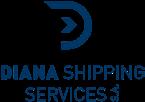
The International Maritime Organization (IMO) plays a key role in creating a unified regulatory framework that applies equally to all shipping companies, regardless of their flag state. Without global rules, fragmented regional policies could lead to unfair competition, regulatory arbitrage, and compliance challenges for shipowners and operators. Instead, harmonized policies, such as those from the IMO’s Marine Environment Protection Committee (MEPC), provide clarity and stability for the industry. A global approach ensures that sustainability efforts are effective and enforceable, prevents companies from shifting operations to weaker regulatory regions, and encourages investment in green technologies. A global regulatory framework remains the best path forward for a fair and sustainable shipping industry.
What inspired your company to embed ESG principles into its core operations and how do these align with your long-term business goals?
Diana Shipping Inc. has long recognized that sustainability is
not merely a compliance obligation but a strategic imperative. Our commitment to Environmental, Social, and Governance (ESG) principles stems from our belief that responsible corporate practices create long - term value for all stakeholders-employees, investors, customers, and society at large.
Our ESG journey is driven by a dual objective: mitigating environmental impact while fostering a resilient and inclusive workforce. As a leader in dry bulk shipping, we continuously invest in fuel-efficient technologies, alternative energy solutions, and operational best practices to minimize our carbon footprint. These efforts align with our longterm business goal of maintaining a modern, efficient, and environmentally responsible fleet.
Beyond environmental initiatives, we emphasize the social aspect of ESG by ensuring the well-being of our employees, both onshore and at sea. Our commitment to safety, diversity, and professional development reflects our view that a thriving workforce is integral to sustainable growth. Strong governance mechanisms underpin these initiatives, ensuring transparency, ethical decision-making, and accountability in all aspects of our operations.
Can you share the key highlights of your award-winning initiative and how it demonstrates leadership within the maritime industry?
At the 2024 ESG Shipping Awards, Diana Shipping Inc. was honoured with the Gold Diversity, Equity & Inclusion (DEI) Leader Award. This recognition underscores our unwavering commitment to fostering a workplace culture that prioritizes fairness, inclusivity, and equal opportunity.
One of the cornerstones of our ESG strategy is our gender equity and inclusion programme, which ensures fair hiring practices, cultural awareness, and a harassment-free work environment. Our participation in the Diversity@ Sea initiative further strengthens our commitment to inclusivity by promoting equal opportunities for seafarers of diverse backgrounds.
Our Youth@Diana program is another key initiative aimed at enhancing youth employability. By providing targeted training, mentorship, and career development opportunities, we empower young professionals to build successful careers in maritime. In addition, we enforce strict policies against violence,
discrimination, and harassment, ensuring a safe and respectful workplace for all employees. Comprehensive training and a confidential reporting system support our commitment to maintaining a positive and ethical work environment.
We are also proud to have received the prestigious Gold Environment Leader Award at the 2024 ESG Shipping Awards in Athens. This recognition highlights our strong dedication to environmental stewardship, a fundamental pillar of our ESG strategy.
Our decarbonization plan, celebrated for its ambition and innovation, spans short-, mid- and long-term, and long-term goals beyond 2030. Key initiatives include ordering two high efficiency next generation new-building methanol dual-fuel Kamsarmax dry bulk vessels, investing in offshore wind farm support vessels, fleet benchmarking, integrating carbon capture and storage systems onboard, testing alternative fuels, retrofitting energy-saving devices, deploying self-operating hullcleaning robots, and applying advanced nano-coating technology to ships’ hulls. Together, these actions aim to significantly reduce greenhouse gas emissions while enhancing the environmental efficiency of our fleet.
Receiving both the Gold DEI Leader Award and the Gold Environment Leader Award reaffirms our commitment to leading the maritime industry’s transition to sustainability. These prestigious accolades reflect our role in setting new standards for environmental performance and social responsibility, demonstrating that sustainability and profitability can go hand in hand. Our ESG approach goes beyond compliance - it is about shaping the future of global shipping through innovation, strong governance, and a steadfast commitment to positive change.

By adopting cleaner technologies, promoting social equity and establishing strong governance, the shipping sector can contribute to a more sustainable future, say Andreas & Nikolaos Mattheos, CEOs of Dianik Bross Shipping Corporation S.A. They add that the shipping industry's transition towards sustainability requires global regulations to ensure fairness and consistency.
They also stress that shipping is responsible for a significant share of global emissions and to reduce this impact, the industry must transition to cleaner energy sources, noting that collaboration between shipowners, fuel providers, policy makers and technology developers is required. On Dianik Bross Shipping, they point out that proof that any company - regardless of its scale - can be a catalyst for change across the entire shipping industry. «By continuing to improve and expand our sustainability efforts, we aim to be a model for responsible and progressive shipping businesses», the two senior shipping executives point out
Should regulations governing the transition of shipping to a sustainable future have global applicability to ensure fair competition and consistency?
The transition of the shipping industry towards sustainability requires global regulations to ensure fairness and consistency.
A fundamental reason for global regulations is the international scope of shipping. Unlike other industries, maritime trade is not confined within national borders; ships travel between multiple jurisdictions and operate in international waters. If sustainability rules vary widely across regions, it would create a fragmented regulatory landscape, causing inefficiencies and confusion for shipping companies. This inconsistency may discourage compliance and hinder progress toward reducing the industry's environmental footprint. Global regulations would provide a cohesive framework, ensuring that all stakeholders adhere to the same standards, thereby facilitating a more streamlined and effective transition to sustainability.

Fair competition is also a concern. If regulations are not the same everywhere, some shipping companies may operate under less strict rules, giving them an unfair advantage over those in stricter regions. A globally standardized set of regulations would prevent this, ensuring equal conditions for all.
Achieving global alignment is challenging due to different national priorities and readiness levels, but international cooperation, led by
organizations like the IMO, is key. A globally harmonized approach is the best way forward for a sustainable shipping industry.
In your view, what role does the maritime industry as a whole play in addressing global ESG challenges and how can industry-wide collaboration drive meaningful progress?
The maritime industry plays a key role in addressing global Environmental, Social, and Governance challenges due to its influence on trade, emissions, and social responsibility. As a major facilitator of global commerce, the industry must adopt sustainable practices aligned with global ESG goals. By embracing cleaner technologies, promoting social equity, and establishing strong governance, the maritime sector can contribute to a more sustainable future.
Environmentally, the maritime industry is responsible for a significant share of global emissions. To reduce this impact, the industry needs to transition to cleaner energy sources. Collaboration between shipowners, fuel providers, policymakers, and technology developers is vital to scaling these solutions.
Social responsibility in the maritime sector includes seafarer welfare, fair labor, and diversity. Seafarers face difficult conditions, including long isolation and limited healthcare. It’s important to create fair working conditions, mental health support, and diverse, inclusive practices within the workforce.
Governance is essential for promoting ethical and transparent practices. Strong governance ensures compliance, prevents corruption, and improves corporate accountability. Corporate social responsibility policies further ensure that companies uphold sustainability commitments and ethical standards.
In conclusion, the maritime industry has an important role in addressing global ESG challenges. Collaboration across the sector will drive progress in environmental sustainability, social responsibility, and governance. By working together, the industry can create a more resilient, sustainable, and equitable future. Strengthening global cooperation, investing in innovation, and ensuring ethical labor practices will help the maritime sector meet sustainability goals.
What sets your award-winning initiative apart as a model for the maritime industry and how do you envision its
success inspiring similar efforts across the sector?
At Dianik Bross Shipping, our award-winning initiative stands out as a model for the maritime industry by demonstrating that even a smaller-scale company can drive meaningful sustainability and innovation. Our approach focuses on three key pillars: environmental responsibility, crew welfare, and technological advancement. By integrating these principles into our operations, we have proven that size is no barrier to making a significant impact.
Environmental responsibility is at the core of our operations. We actively participate in marine conservation programs and adhere to stringent international regulations to prevent pollution. By investing in sustainable technologies and collaborating with regulatory bodies, the aim is to minimize ecological footprint and contribute to a cleaner maritime industry.
Another distinguishing factor is our unwavering dedication to crew welfare. Recognizing that a motivated and well-supported crew is integral to operational success, we have implemented a comprehensive well-being program that includes mental health support, continuous training, and fair rotation schedules.
The success of our initiative serves as a powerful reminder that meaningful change is possible regardless of company size. By demonstrating that sustainability and efficiency go hand in hand, we hope to inspire other -small and midsized shipping companies to adopt similar practices.
Our commitment to excellence and progress is deeply rooted in our history. Dianik Bross Shipping carries forward the legacy of our father, Captain Stefanos Matthaios (1935–2017), whose extensive maritime career and entrepreneurial vision laid the foundation for our company. His legacy continues to inspire our pursuit of innovation and responsibility in maritime operations.
At Dianik Bross Shipping, our goal is to prove that every company, no matter of its scale, can be a catalyst for industry-wide change. By continuing to refine and expand our sustainability efforts, we aim to serve as a model for responsible and forward-thinking maritime operations. Our journey has only just begun, and we look forward to inspiring and collaborating with others to create a cleaner, safer, and more efficient future for global shipping.


The maritime industry contributes around 2 pct of global carbon emissions, primarily from oil-based fuels that power most vessels. In response, the International Maritime Organization has set ambitious goals to achieve net-zero emissions by 2050, with phased targets for alternative fuels. In this context, the Country Director of Cyprus for Fleet Management Limited, Mike Bradshaw, says that Fleet Management is committed to this transition, investing in green technologies and research while helping clients navigate the challenges and opportunities of sustainable shipping. Beyond green technologies, according to Mr. Bradshaw, the company is committed to supporting the wellbeing of seafarers through innovative programmes focused on health, safety, and mental wellness. «By leveraging technology, Fleet Management is accelerating progress while ensuring compliance with emerging regulations, earning recognition at the ESG Shipping Awards».
To what extent does the cost of transitioning to sustainable shipping impact profitability within the shipping sector?
The maritime industry is responsible for around 2 pct of carbon emissions, largely accrued from the oil-based fuels which make up the vast majority (99 pct) of the industry’s energy consumption. Eighteen months ago, the International Maritime Organization laid out its plans to reach net zero emissions by 2050, as well as staggered goals for the take up of alternative fuels. The transition to sustainable shipping will require every company to play our part. At Fleet Management, we are investing in research, green technologies and the training required to implement them at scale. We are also helping our clients to address challenges and seize opportunities to deliver both a positive societal impact and longterm profitability.
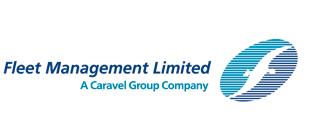
LNG, for example, produces lower greenhouse gas emissions (20 pct30 pct less CO²) compared to diesel, and emits fewer nitrogen oxides (NOx) and virtually eliminates sulphur oxides (SOx) emissions. LNG engines are also more efficient and over time, which translates into greater savings accelerated by the fact that LNG has a higher energy density than diesel, allowing ships to travel longer distances with less fuel. Investing in sustainable shipping is not just the right thing to do for our planet; it is the right thing to do for our business, and for our clients. We know that performing strongly on a range of ESG metrics attracts new partnerships, better financing
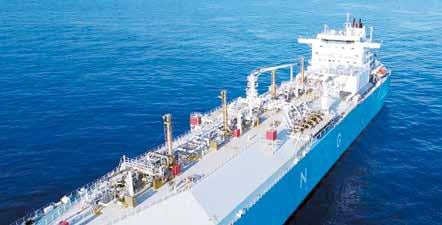
and clients who value sustainability, as well as the lower risks that come with transitioning effectively.
What do you see as the biggest opportunities for driving sustainability in shipping and how is your company positioning itself to seize them? We need to look at the entire spectrum of environment, social and governance (ESG) strategies to deliver a sustainable future for the industry. To reduce emissions, the single biggest opportunity for shipping is to transition quickly to green fuels such as methanol, ammonia and hydrogen, as well as wind-assisted propulsion. Fleet Management is already partnering with clients and partners to trial new technologies and fuels such as ammonia bunkering, solar panels and air lubrication systems. We are also sharing knowledge and best practice so we can drive the transition to green fuels. This is exemplified by recent green methanol workshops hosted by the Hong Kong University of Science and Technology.
There are enormous opportunities for our industry to support an equitable transition, too. We recognise that our people are our most vital asset, and it is incumbent on us to support the health and wellbeing of seafarers and their families.
Our dedicated Fleet Care team continues to develop innovative programmes to support seafarers’ holistic health, and includes three in-house clinical psychologists to improve mental health – a critical, industry-wide issue. Technology also has a role to play in helping the industry to advance faster and further. We are leveraging data, analytics and technological advancements to accelerate impact and improve accountability. For example, our long established PARIS and NOVA technology platforms have helped our clients realise the benefits of route optimization and
predictive maintenance which reduce carbon emissions, as well as costs.
These tools are also the frontline of our work to manage the rapidly changing regulatory environment, helping clients to comply with new legislation such as the European Union Emissions Trading Scheme (EU ETS) and FuelEU Maritime Regulation. We continue to collaborate with regulators and partners to ensure we are ready for the transition.
How does your company’s award-winning action reflect its overall commitment to innovation and sustainability and what does this mean for the future of your ESG strategy?
As one of the world’s leading ship management companies, we recognise that our industry’s success relies on the people who power our ships, which in turn move 90 pct of goods and support global trade. Our business is only as resilient as our people; so, we are deeply focused on the health, safety and wellbeing of our employees and seafarers.
Fleet Care was launched 15 years ago and delivers a range of onboard and onshore help. We created holistic programmes to address mental and physical wellbeing, as well as improve facilities and connectivity onboard ships. We are focused on creating a workforce fit for the future, for example by fostering more diversity. ESG training of all types – including gender sensitization training – has created a much more accepting workplace and is one of the reasons that lie behind the rapid rise in the number of female seafarers. By investing in innovation, Fleet Management can scale up solutions across our worldwide fleet and help our partners and the industry to move more quickly. We are delighted these initiatives have been recognised at the 2023 ESG Shipping Awards.
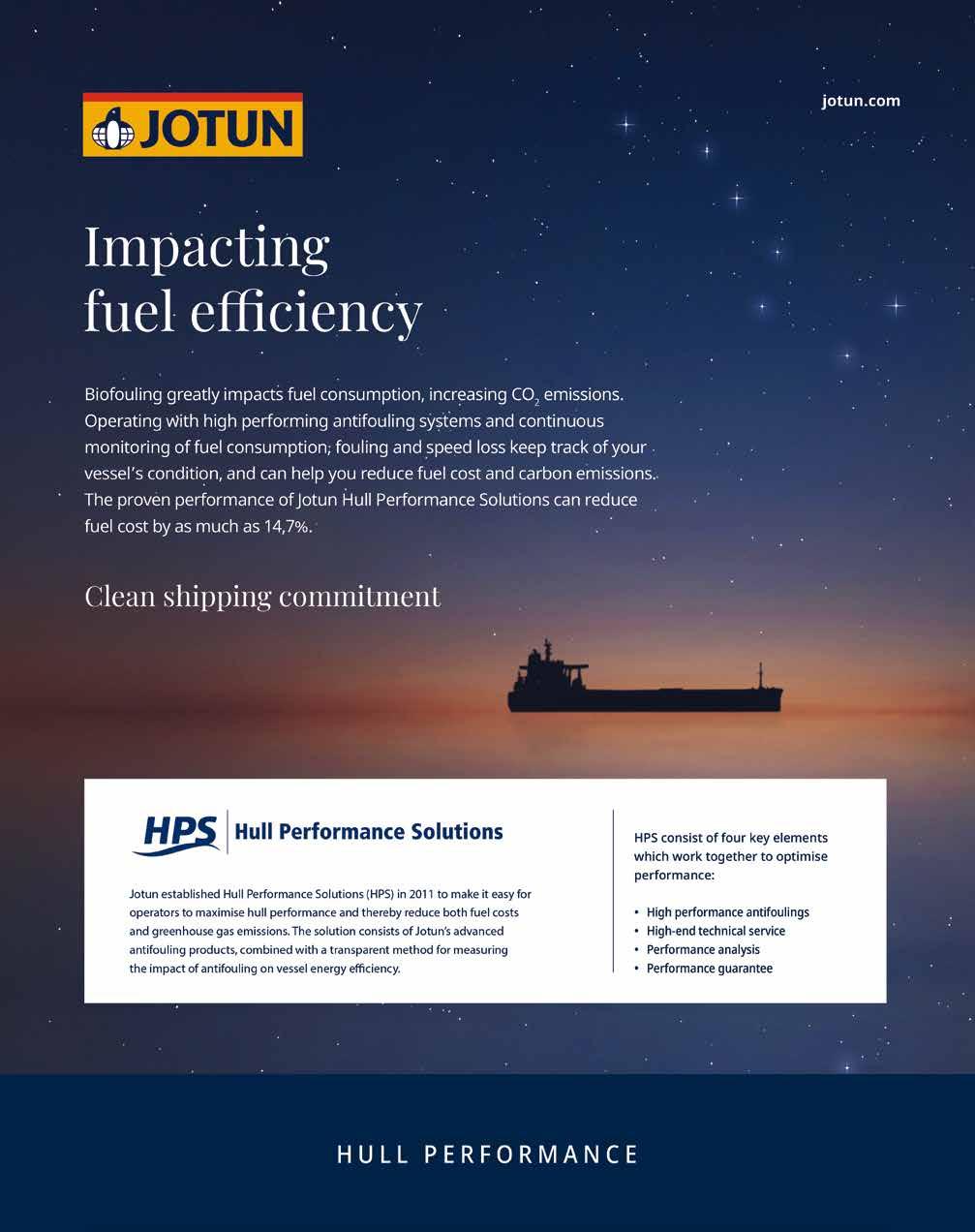
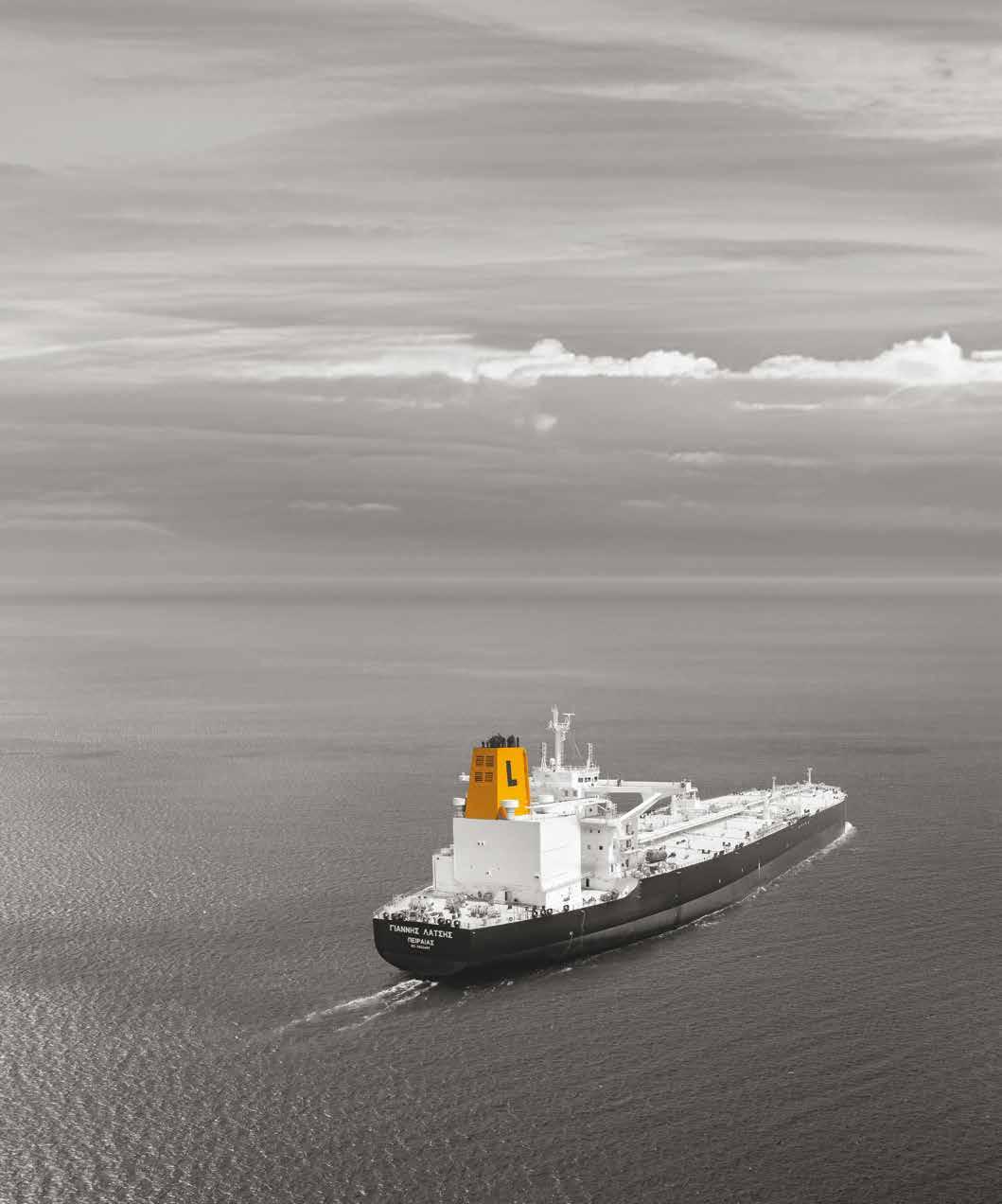
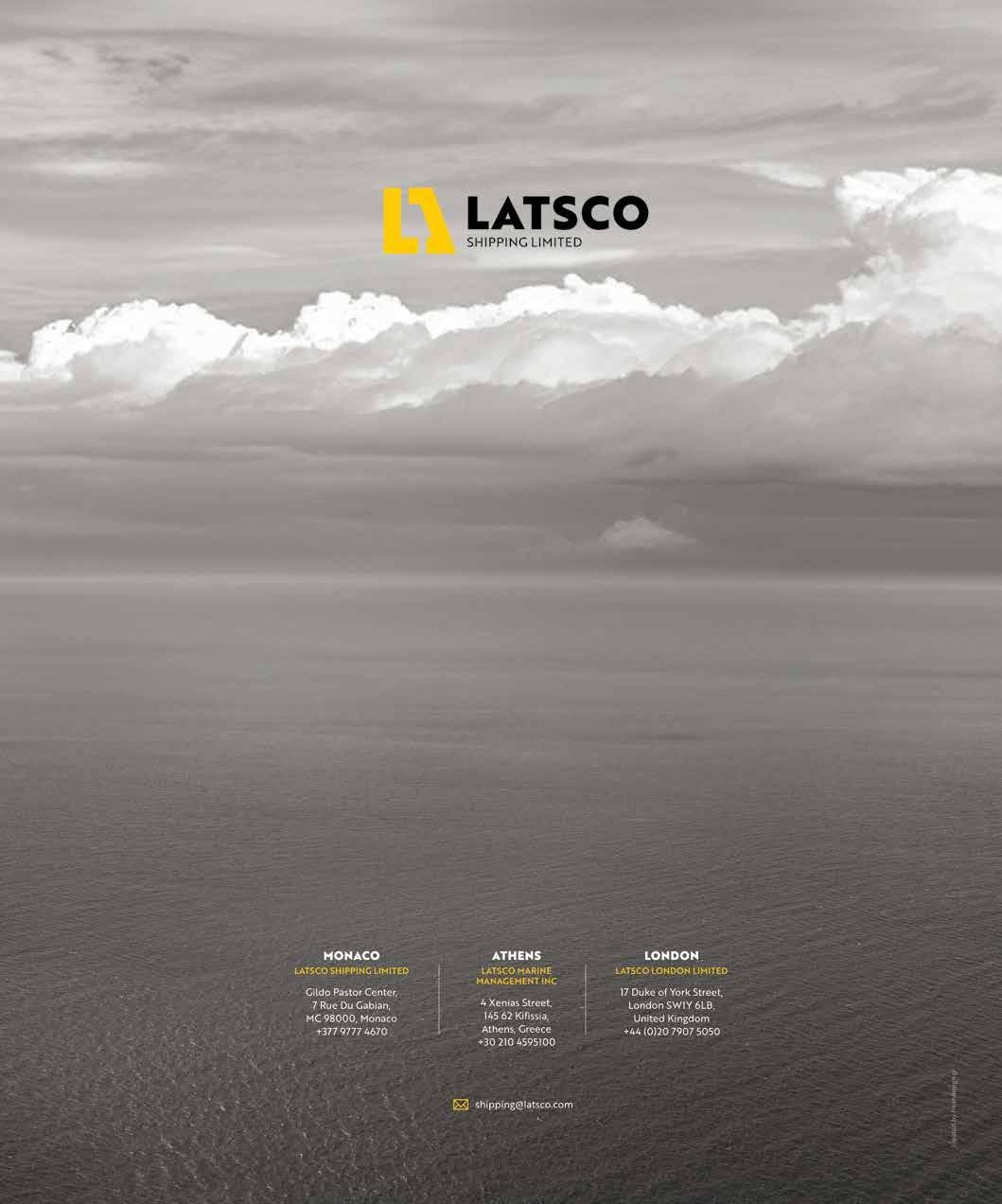


The diversification of regional regulations on the shipping industry’s path to decarbonization increases complexity and costs for global operators, says Lydia Stathi, sustainability assistant, Latsco Marine Management. She says that regulatory uncertainty on this issue complicates long-term planning for companies making it financially risky to invest towards the green transition particularly due to the unclear future availability of sustainable fuels. She also stresses that effective implementation requires coherent, globally applicable rules to ensure a fair and smooth transition for the entire shipping industry. Stathi stresses that global cooperation is key to achieving real progress on the three ESG pillars as no single company or nation can tackle the huge challenge of decarbonization alone. She also points out that the company, through its strategy, is committed to actively shaping its future workforce by developing initiatives to attract young people to the maritime profession both in the office and at sea.
Should regulations governing the transition of shipping to a sustainable future have global applicability to ensure fair competition and consistency?
The IMO’s 2023 strategy aims to reduce GHG emissions and transition to more sustainable technologies in shipping, with the goal of achieving net-zero emissions by 2050. Additionally, regional initiatives like the EU’s Emissions Trading System (ETS) and FuelEU Maritime are also driving change.
The variation in regional regulations increases complexity and costs for global operators. Shipping companies face challenges such as navigating differing regulations, adopting multiple technologies, and managing complex reporting requirements. These factors add administrative burdens and create competitive imbalances between stricter and less-regulated regions.
Additionally, regulatory uncertainty complicates long-term planning and makes investing in emerging technologies, such as green ships, financially risky, especially due to the unclear future availability of sustainable fuels. Clear regulations help shipping companies make informed decisions and plan better for the future.
Effective implementation requires consistent, globally applicable rules to ensure a fair and smooth transition across the industry. This approach would improve cost efficiency and scalability by simplifying
the process and reducing costs linked to different regional regulations, thereby promoting fair competition. Companies could focus on investing in technologies and solutions that can be applied uniformly across their fleets. Clear guidelines would also encourage innovation, helping the industry move faster towards its goals.
In this context, collaboration and cooperation among governments, industry stakeholders, and international organizations are key to aligning priorities, reaching consensus, and ensuring these measures are effectively implemented.
In your view, what role does the maritime industry as a whole play in addressing global ESG challenges and how can industry-wide collaboration drive meaningful progress?
As a contributor to global greenhouse gas emissions, the sector’s commitment to ESG principles is crucial for achieving international climate goals.
It is very positive that many shipping companies now publish ESG reports and disclose their sustainability performance, allowing stakeholders to assess their progress and alignment with industry-wide best practices.
Collaboration and global cooperation are the key to achieving real progress on the three ESG pillars. No single company or nation can tackle the enormous challenge of decarbonization, on their own. Collective action allows for knowledge sharing, pooling of resources, and the development of technologies to support sustainable practices.
For example, collaboration among shipping companies, fuel producers, ports, engine manufacturers and research institutions, is crucial to scaling alternative fuels and developing the necessary infrastructure. Partnerships with governments and international organizations are also critical to establishing consistent global standards, offering economic incentives, and implementing policies that facilitate and speed up the uptake of sustainable technologies.
By supporting research and development, the maritime industry can become a global leader in sustainability, setting an example for other sectors and contributing to broader climate goals. As these efforts progress, they will drive the entire supply chain towards a low-carbon future, while providing an economic incentive for all players in the industry to work together for long-term success.
Can you share the key highlights of your
award-winning initiative and how it demonstrates leadership within the maritime industry?
As a company deeply rooted in Greece’s shipping legacy, we recognize the importance of nurturing the next generation of maritime professionals. We honour the vision of our founder, Capt. John Latsis, to be pioneers in our industry while giving back to the initiatives, we serve. Through our “Supporting Youth in Shipping” initiatives we genuinely aim to inspire a passion for maritime careers, ensuring that the knowledge, skills, and traditions of the industry are preserved for future generations. Our focus on the younger generation has become embedded in our company’s strategy and culture, encompassing all aspects, involving all departments and every hierarchical level. We are proud to see that these initiatives have been embraced by both the leadership and all of our colleagues.
More specifically, we engage in activities related to maritime professions, both in the office and at sea. Our strategic approach is based on three pillars:
Firstly, we develop initiatives that engage students, from primary school to university, with the dynamic world of the shipping industry. The objective is to attract talent to the industry and cultivate a passion for the profession.
Secondly, we provide educational and training opportunities to the younger generations, which include awarding scholarships, providing training programmes to Merchant Marine Academies, donating digital learning tools, and offering financial support to students participating in international competitions. Our goal is to empower individuals to pursue their aspirations and excel in their chosen fields.
Furthermore, we actively participate in career events, host business days at our premises in collaboration with various universities and organizations, and offer internship placements with the goal of bridging the gap between education and the job market. These initiatives provide networking opportunities, introduce career paths, and give students and graduates insights into our colleagues’ roles and responsibilities.
Through our strategic approach, we are dedicated to actively shaping the future workforce of the industry and supporting its growth.


ransitioning to sustainable shipping practices may temporarily affect profitability, as Stratos Desypris, COO of Navios Maritime Partners L.P., explains. Owners, including Navios, are investing in energy-saving device retrofits like bulbous bows and hybrid fins, which come with associated costs. Construction of eco-friendly vessels and reliance on sustainable fuels also require higher expenditures, alongside the challenges of complying with stricter regulations. However, Desypris highlights that the long-term benefits are significant: reduced fuel consumption, easier compliance, and potential advantages from carbon taxes and emissions trading schemes. Sustainability is becoming a key competitive advantage, with early adopters like Navios, positioning themselves for success. With over 70 years of experience, Navios was recognized for its leadership in governance with a Gold Award and its commitment to prioritizing its people with a Silver Award. The company remains committed to sustainability, aligning with regulatory and technological advancements, and emphasizes strong governance and employee well-being, ensuring that all stakeholders uphold the highest industry standards.
To what extent does the cost of transitioning to sustainable shipping impact profitability within the shipping sector?
Transitioning to more sustainable shipping practices may have a short-term impact on profitability. Many owners, including Navios, are implementing energy-saving device retrofit programs that involve the installation of efficiency-enhancing devices, such as bulbous bows, propeller boss cap fins, and hybrid fins, on existing fleets. Naturally, there are associated costs with these retrofits. Similarly, the construction of new, environmentally friendly vessels, such as dual-fuel ships, requires higher expenditures. Additionally, industry stakeholders face increased costs from the use of more sustainable fuels and the need to comply with increasingly stringent regulations. However, in the long term, sustainable shipping practices are expected to positively impact profitability by gradually reducing fuel consumption, ensuring easier compliance, and benefiting from carbon taxes and emissions trading schemes that favour more efficient fleets. Consequently, sustainability is becoming an important differentiator, and early adopters, like Navios, will gain a competitive market advantage.
What inspired your company to embed
ESG principles into its core operations and how do these align with your long-term business goals?
As a company with 70 years of history and a strong commitment to continued excellence, sustainability is, and will remain, at the heart of Navios’ values. The company does not regard sustainability as a short-lived trend or a superficial notion, but rather as a fundamental transformation in the way society will operate. In the years ahead, there will be an ongoing interaction between regulatory developments and technological advancements, which will drive sustainability forward. Navios is fully aligned with these future requirements, establishing contracts with like-minded partners and forming alliances that prioritize Environmental, Social, and Governance (ESG) principles.
Can you share the key highlights of your award-winning initiative and how it demonstrates leadership within the maritime industry?
Navios was recognized for its leadership in governance with a Gold Award, and for its commitment to prioritizing its people with a Silver Award. While the company was honored for initiatives in two distinct areas, it is not coincidental that these areas are closely related. With a fleet of nearly 180 vessels, a seafaring workforce of approximately 5,000 crew members, and nearly 350 shoreside employees, Navios acknowledges its responsibility and duty to support its people. This support involves
ensuring that each employee is committed to compliance with all applicable regulations at all times and to the shared goal of working towards a zero-incident future. In both respects, Navios leads the industry by encouraging its people to operate in accordance with the highest standards, providing them with the tools and training necessary to meet and exceed those standards. Most importantly, Navios has established and implemented a robust and comprehensive compliance verification system, equipped with all necessary resources to guarantee that its standards are consistently upheld by all personnel. Whether through its vessel-specific Electronic Oil Record Book software, supported by a dedicated team of specialists monitoring these records in realtime; its economic sanctions compliance policies and procedures, which surpass basic regulatory requirements and are rigorously overseen by internal legal experts and sanctions compliance officer; or its forward-looking, frequently audited Safety Management System, which is consistently ranked among the best in the industry, Navios demonstrates its commitment to its people, empowering them to reach their full potential.


Senior Vice President, Assistant General Counsel, Securities, Sustainability & Compliance
Speaking to Naftemporiki, Angela Stark, Senior Vice President, Assistant General Counsel, Securities, Sustainability & Compliance, Norwegian Cruise Line Holdings Ltd., described the future of the cruise industry.
«The future of our business is closely intertwined with the health of our oceans and the destinations we visit; environmentally friendly practices allow our business to thrive», Angela Stark states. Fifty-nine percent of Norwegian Cruise Line Holdings' fleet is currently equipped with shore power technology, and they have a goal of 70 per cent of there fleet being equipped by year-end 2025. «While these measures will be key for our short- and nearterm targets, we are also exploring long-term solutions and technologies that will further support GHG reductions. For example, we have successfully tested the use of biofuel blends on about 47 per cent of our fleet as a potential transition fuel, while we continue to explore the viability of green methanol», Angela Stark says.
To what extent does the cost of transitioning to sustainable shipping impact profitability within the shipping sector?
Norwegian Cruise Line Holdings is committed to strengthening the local communities in which we live, work and visit as well as the local ecosystems through which we cruise. It is our responsibility and privilege to give back to the communities around the world where we serve. Through partnerships with ports, governments and nonprofit organizations, we seek to maximize social, economic and environmental benefits at the destinations we visit, while delivering exceptional vacation experiences to our guests. Reducing our environmental impact is an essential part of our Company’s mission and culture. We are committed to addressing climate change and doing our part to protect and preserve the environment. We continually seek and invest in new technologies and innovations that will allow us to improve our environmental performance.

The future of our business is closely intertwined with the health of our oceans and the destinations we visit; environmentally friendly practices allow our business to thrive.
What do you see as the biggest opportunities for driving sustainability in shipping and how is your company positioning itself to seize them?
Whether our guests are snorkeling in the crystal blue waters of the Pacific Islands or immersing themselves in the beauty of Alaska’s
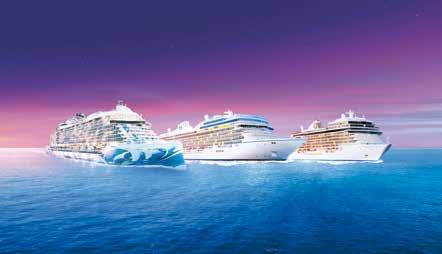
natural wonders and culture, we recognize that our guests’ experiences are inextricably linked to the protection of our planet, its communities and our shared resources. We firmly believe that our efforts to Sail & Sustain are not just the right thing to do, but will make us stronger and more resilient for years to come. n April 2023, we announced short- and near-term targets to provide a roadmap on our pursuit to net zero greenhouse gas (GHG) emissions by 2050. We are targeting a reduction of GHG intensity of 10 per cent by 2026 and 25 per cent by 2030, compared with a 2019 baseline and measured on a capacity day basis. These targets encompass our Company’s emissions from our fleet, islands and facilities (Scopes 1 & 2), as well as upstream fuel- and energy-related activities, including well-to-tank emissions (portion of Scope 3). As such, the targets capture the full well-to-wake emissions impact of our Company’s fuel consumption. Along with these new targets, we launched our revamped climate action strategy, which focuses on three main actions: implementing solutions for efficiency today, innovating for future solutions and collaborating with our stakeholders along the way. We are enhancing our fleet’s efficiency with measures such as HVAC upgrades and waste heat recovery systems, in addition to optimizing our itineraries. We are also investing in shore power technology, which will allow us to connect to onshore electrical power grids with the appropriate port infrastructure. Fifty-nine percent of our fleet is currently equipped with shore power technology, and we have a goal of 70 per cent of our fleet being equipped by year-end 2025. While these measures will be key for our short- and nearterm targets, we are also exploring long-
term solutions and technologies that will further support GHG reductions. For example, we have successfully tested the use of biofuel blends on about 47 per cent of our fleet as a potential transition fuel, while we continue to explore the viability of green methanol. To prepare for this transition, we continue to collaborate with our partners and have reconfigured the designs for the final two Prima Class ships, expected in 2027 and 2028, to accommodate the use of green methanol as a future fuel source.
How does your company’s award-winning action reflect its overall commitment to innovation and sustainability and what does this mean for the future of your ESG strategy?
Guided by our core values, our Sail & Sustain program is centered around five key pillars: reducing environmental impact, sailing safely, strengthening our communities, empowering people, and operating with integrity and accountability. As part of our impact to the environment, facing climate change, we are taking steps to be part of the solution. Underpinning our climate action strategy is good governance and effective risk management. The strategy includes implementing solutions for efficiency today, innovating for future solutions and collaborating with our stakeholders along the way. We also believe it is our responsibility to contribute to the communities around the world where we visit, live and work. In 2023, we donated nearly $1.6 million in cash, cruise and other inkind donations to important causes. We firmly believe our culture and commitment to empowering people allows us to attract and retain top talent, while providing robust career development opportunities that ultimately result in significant value to our stakeholders.
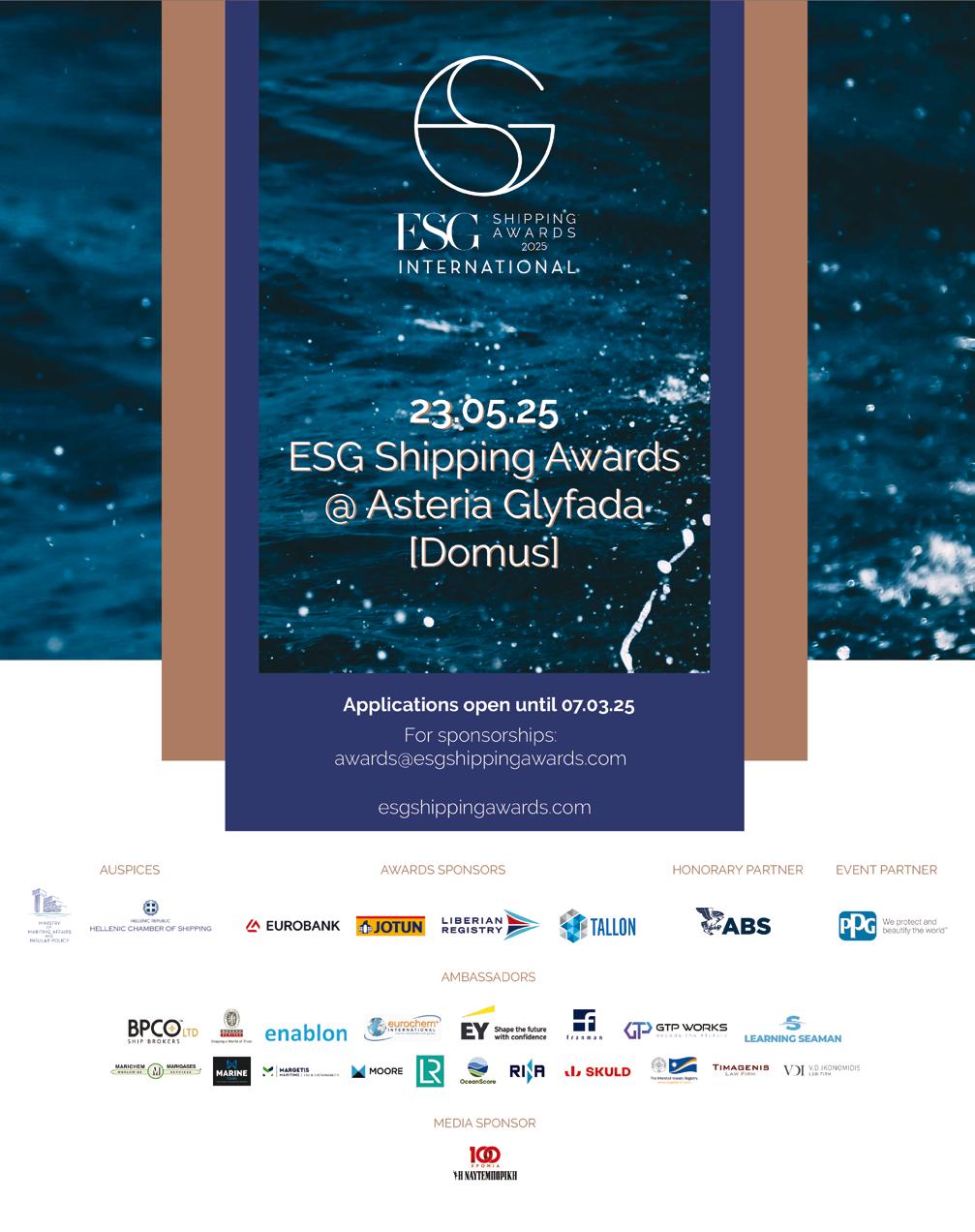
SUPPORTED BY

CFO/ Director

s the shipping sector plays a crucial role in global trade, transitioning to a sustainable future requires consistent regulations that ensure fair competition across jurisdictions», says Mrs. Korinna Tapaktsoglou, CFO/Director of Pioneer Marine Inc. She added that when regional regulations differ, they create complexities and inefficiencies, undermining the collective effort toward environmental sustainability. The CFO/ Director of Pioneer Marine told «N» that while the EU ETS exemplifies this challenge, highlighting the need for a global approach, a unified regulatory framework would foster innovation, reduce market volatility, and support climate goals, helping the industry remain competitive while contributing effectively to global sustainability. Finally, Tapaktsoglou said that Pioneer Marine advocates for harmonized global standards to enhance both environmental and business outcomes.
Should regulations governing the transition of shipping to a sustainable future have global applicability to ensure fair competition and consistency?
Shipping is a sector that has a significant global impact since the vessels are traversing multiple jurisdictions and engaging in trade across several countries. When regulations vary significantly across regions, they create inconsistencies that can divert attention and resources from advancing sustainable practices. In such an environment, companies may be forced to focus on navigating complex regulatory requirements, which undermines collective efforts toward global sustainability.
The newly implemented EU ETS exemplifies this issue. For the avoidance of doubt, in Pioneer Marine we believe that this is a good measure with an aim to reduce greenhouse gas emissions; however, we disagree with its regional focus which creates complexities for shipping companies (i.e., cost implications, market volatility) and unfair competition. Climate change is a global issue that requires a unified approach to reduce greenhouse gas emissions; thus, a global ETS would be more appropriate in helping to meet international climate targets.
The global applicability of regulations would not only ensure a level playing field and fair competition, but also encourage collaboration among nations and economic zones. Such harmonization fosters innovation, facilitates the sharing of best practices, and drives progress on the

environmental agenda. By adopting consistent global standards, the shipping sector can more effectively contribute to a sustainable future while maintaining operational efficiency and equal competition.
What inspired your company to embed ESG principles into its core operations and how do these align with your long-term business goals?
We strongly believe that responsible business practices form the foundation for a better future. In today’s challenging environment, we recognize the need to prioritize sustainability and align our practices with global goals (such as the UN Sustainable Development Goals).
Incorporating ESG principles into our strategic framework enables us to improve our overall business model in a variety of ways, such as:
•further improve our transparency and accountability practices, which have been crucial in our operations from the beginning.
•effectively identify and mitigate risks linked to environmental regulations and social accountability.
•improve our access to talent, as people increasingly look to work for companies that share their values.
•improve our access to capital, as investors increasingly seek to invest in companies with strong ESG profiles.
•overall enhance our brand and further strengthen our relationship with our stakeholders.
This approach safeguards our long-term sustainability by allowing us to gain a competitive advantage over our peers.
Our overall commitment to ESG practices is in line with our longterm business goals; investing in sustainable practices not only enhances operational efficiency and reduces the company’s
environmental footprint but also drives profitability in the long run.
Can you share the key highlights of your award-winning initiative and how it demonstrates leadership within the maritime industry?
Pioneer Marine is honoured to have received the Governance Award for a second year (Silver in the Awards of 2024, and Bronze in those of 2023). This recognition, achieved alongside prominent industry leaders, underscores the substantial progress we have made in a short span of time. Our adoption of a comprehensive set of «Standards of Business Conduct & Ethics», clearly addresses a variety of areas, such as Codes of Conduct, anti-corruption, bribery, compliance with sanctions, etc. This clearly «sets the tone at the top». It provides clear guidance to all staff on how to conduct business in an ethical manner and clearly determines what kind of business practices are accepted and what not, providing a moral compass during challenging times.
Our transparent reporting framework allows us to provide timely, high quality performance monitoring, which in turn enables our stakeholders to take prompt strategic decisions as needed. Our overall approach towards transparency fosters the development of honest and truthful relationships with our business partners (i.e. Financial Institutions, Shareholders, etc.). Our governance practices form the bedrock of our organization's values and principles, guiding us towards sustainable success and a positive impact. As we celebrate this milestone, we remain committed to our pursuit of sustainability and responsible business practices, in line with leading practices in our industry.

Stavros Niotis Chief Sustainability Officer

ustainability aspects that have a cost in the shipping industry are those related to the global transition towards cleaner energy and fuels, according to Prime Marine. Taking the right decisions on these aspects will be a challenge, especially for the early movers, but the cost on the company's profitability will depend on the decisions and the timing that these are taken, Stavros Niotis, Chief Sustainability Officer, Prime Marine, told Naftemporiki, adding that, «this is an environment that shipping businesses have always been working in». Prime Marine received the Silver 2023 Eco-Efficiency Leader Award from from ESG Shipping Awards International. Analyzing the company's ESG policies, Niotis highlights that: «We have been one of the frontrunners in the shipping industry, applying an integrated and comprehensive retrofitting plan on our existing fleet for improving our ships’ energy efficiency well before any IMO regulation development on this aspect. Based on all of these, in 2023, we reported year-onyear improvements of 6.2 pct at AER scale and 13.4 pct at EEOI scale for our tanker fleet, and 13.3 pct at AER and 8.2 pct at EEOI scale for our dedicated ammonia carrier fleet, and this was the reason we received the Silver Eco-Efficiency ESG Shipping Award».
Do you think that conflicts, geopolitical tensions and the increasing trade protectionism promote ESG objectives in the maritime industry?
Definitely not! We need to be clear on this, geopolitical tensions and wars are fundamentally against any of the UN Sustainability Development Goals (SDGs), and if we want to stay on track to our goals, we need first to stop wars and tensions everywhere on earth. Trade protectionism and sanctions are against open and transparent marine transportation and maritime industry. Therefore, any action or discussion around all these terms is moving attention away from our ESG objectives and the efforts we need to put all nations and industries together as a United human community.
To what extent does the cost of transitioning to sustainable shipping impact profitability within the shipping sector?
Sustainable shipping has many aspects, the same as sustainability in general, and the best way to define the impact of these aspects in the profitability of an industry is to use the UN’s definition of the 17 Sustainable Development Goals (SDGs) and assess the impact of each goal to this industry. The maritime industry is not linked to all of the
17 SDGs, but it is attached to many of them.
Most of the shipping industry’s sectors (especially those involved in global trade), have been addressing many of the sustainability aspects, like those related to human safety and social care, governance or air and water pollution, for many years - even before the establishment of the UN SDGs, mainly driven by IMO regulations, charterers requirements and standards or even by private initiatives.
Keeping track of those goals and taking initiatives for further improvement will not impact the profitability of a shipping company, on the contrary it will create opportunities for continuous business development.
The sustainability aspects that have a cost are those related to the global transition towards cleaner energy and fuels. Taking the right decisions on these aspects will be a challenge, especially for the early movers, but the cost on the company's profitability will depend on the decisions and the timing that these are taken. But this is an environment that shipping businesses have always been working in.
Can you share the key highlights of your award-winning initiative and how it demonstrates leadership within the maritime industry?
In 2013, identifying the importance of monitoring and controlling our fleet’s gas emissions, we established a dedicated Energy Efficiency and Environmental Department, and, since then, we have invested significantly into enhancing our existing ships’ energy efficiency, improving our operational
effectiveness and exploring new technologies providing viable solutions.
We have applied silicone and advanced anti-fouling hull painting schemes on all of our ships since almost a decade ago, and we have observed performance improvement of up to 20 pct. Since 2015, we also retrofitted all of our fleet with Energy Saving Devices (ESDs), like propeller ducts and propeller cap fins, resulting to fuel and emission savings between 5 pct and 8 pct, while we also installed high-frequency sensors, Coriolis mass flowmeters in the main and auxiliary engines, and bridge instrumentation that provide us with valuable data for monitoring their performance and taking targeted decisions. We have been one of the front-runners in the shipping industry, applying such an integrated and comprehensive retrofitting plan on our existing fleet for improving our ships’ energy efficiency well before any IMO regulation enforcement on this aspect.
Based on all of these, in 2023 we reported year-on-year improvements of 6.2 pct at AER scale and 13.4 pct at EEOI scale for our tanker fleet, and 13.3 pct at AER scale and 8.2 pct at EEOI scale for our dedicated ammonia carrier fleet, and this was the reason we received the Silver Eco-Efficiency ESG Shipping Award.
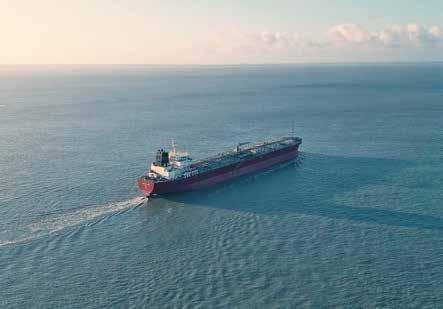


MASTERS OF THE SEAS SHARING THEIR LIFE STORY
50 extraordinary Greek shipowners unfold their life’s journey in a luxurious English-language edition by "Naftemporiki"

387 photographs
Information: 210 519 8000 subscriptions@naftemporiki.gr Visit the N-Bookstore

520 pages

In a sector where newbuilding orders are at historic lows, the cost of constructing a new vessel is two to two-and-a-half times greater than buying a high-quality, 12-year-old second-hand ship. Additionally, with continuous shifts in environmental regulations, predicting the design of a «future-proof» vessel with a 25-year lifespan becomes increasingly challenging.
Seanergy Maritime Holdings CFO, Stavros Gyftakis believes that «investing over 70 million, with no clear certainty on whether it will pay off in 15, 20, or 30 years, is a significant risk in such an unpredictable environment».
As Seanergy has been focusing on ESG principles, the company has been awarded twice at the ESG Shipping Awards International (2024, People Leader Award, Bronze - 2024, Industry Partnership Leader Award, Silver).
Moreover, Gyftakis explains, «as ESG principles continue to evolve, Seanergy evolves with them. Each step forward helps us raise industry standards, embed sustainability into our strategy, and strengthen our competitiveness, supporting the maritime industry’s transition to a greener future».
To what extent does the cost of transitioning to sustainable shipping impact profitability within the shipping sector?

At Seanergy, we are aiming at carefully balancing adoption of new technologies with economic realities through strategic planning. Transitioning to sustainable shipping requires substantial initial investments, such as retrofitting vessels, adopting advanced technologies, and preparing for alternative fuels. These expenditures are not just short-term costs, but strategic capital investments designed to achieve consistent reductions in operating expenses, while enhancing energy efficiency as means to deliver a measurable return on investment. By focusing on solutions that provide both environmental benefits and economic value, we ensure our investments support sustainable growth while aligning with evolving regulations.
Our approach focuses on costeffective and scalable solutions. For instance, silicon-based paints significantly reduce hull resistance, have a direct impact on fuel consumption and enhance vessel efficiency. This has a direct commercial benefit, since the charterers realize lower fuel costs, resulting in a win-win model that aligns operational performance with environmental objectives.
To support these investments, Seanergy utilizes sustainability-
linked loans, aligning financial performance with clearly defined ESG milestones. These mechanisms reward measurable progress, enabling disciplined capital allocation while achieving long-term decarbonization goals.
Collaboration with charterers further mitigates financial risks by sharing the costs of environmental upgrades, ensuring regulatory compliance while maintaining economic flexibility. This cooperative approach strengthens long-term partnerships and helps us adapt to changing market conditions.
While the cost of transitioning to sustainable shipping is significant, Seanergy views it as an opportunity to enhance operational resilience and future-proof its business. By aligning economic and environmental objectives, we aim to balance profitability with our commitment to a greener maritime future.
What inspired your company to embed ESG principles into its core operations and how do these align with your long-term business goals?
At Seanergy, we embrace ESG principles because we believe it is a catalyst for meaningful change. ESG should not be viewed merely as a regulatory requirement but as an opportunity to drive improvement, innovation, and operational excellence. By integrating ESG into our core values, we ensure that sustainability is fully aligned with our business objectives.
Our commitment to decarbonization is demonstrated through a clearly defined strategy, executed consistently with focus on continuous energy efficiency improvements for our fleet. Instead of investing in expensive newbuildings that utilise unproven fuel technologies, we have identified as the best value proposition acquiring secondhand vessels of high specifications, which we retrofit with proven, cost-effective technologies. This ensures operational reliability, regulatory compliance, and tangible economic benefit through enhanced commercial performance.
In a sector where newbuilding orders are at historic lows, the cost of constructing a new vessel is two to two-and-a-half times greater than buying a high-quality, 12-year-old second-hand ship. Additionally, with continuous shifts in environmental regulations, predicting the design of a «future-proof» vessel with a 25-year lifespan becomes increasingly challenging. Investing over $70 million, with no clear certainty on whether it will pay off in 15, 20, or 30 years, is a significant risk in such
an unpredictable environment. As ESG principles continue to evolve, Seanergy evolves with them. Each step forward helps us raise industry standards, embed sustainability into our strategy, and strengthen our competitiveness, supporting the maritime industry’s transition to a greener future.
Can you share the key highlights of your award-winning initiative and how it demonstrates leadership within the maritime industry?
Seanergy’s participation in the EU-funded SAFeCRAFT project marks a significant milestone in our sustainability journey. By dedicating one of our Capesize vessels as a demonstration platform, we are testing hydrogen as a sustainable fuel source to power electric generation and partially support propulsion. This initiative, aligned with FuelEU Maritime 2040 targets, aims to achieve a 26 per cent reduction in CO2 emissions.
The project represents a practical approach to decarbonization. By retrofitting an existing vessel, we address key challenges such as hydrogen storage, safety, and propulsion while refining tools to measure energy efficiency and emissions reductions. This handson demonstration highlights how existing fleets can transition to alternative fuels without costly newbuilds, offering scalable solutions across the industry. Collaboration is central to this initiative. With 11 partners from six countries, including leading universities and engineering firms, the SAFeCRAFT consortium brings together expertise to solve critical challenges. Seanergy actively contributes to the development of technologies and guidelines to accelerate the adoption of Sustainable Alternative Fuels (SAFs) across the maritime sector.
This project highlights Seanergy’s proactive approach to driving environmental progress and operational efficiency. By delivering practical solutions and forming key partnerships, we strengthen both our financial and environmental resilience while supporting the maritime industry’s transition to sustainability.

Shipping needs a global regulatory framework for the industry’s green transition.
According to Georgia Fardellou, Head of ESG and Corporate Communications, Star Bulk Carriers Corp, «without uniform rules, regional variations could hinder global sustainability efforts and make it more challenging to reduce carbon emissions».
In an interview with Naftemporiki, Star Bulk’s ESG Head stressed that “these regulations must be flexible to account for regional differences, such as infrastructure limitations or economic challenges”. She added that “tailored timelines and targeted support would ensure a fair and equitable transition for all nations”.
Star Bulk is exploring alternative fuels, renewable energy sources such as wind and solar power, and carbon capture technologies for its vessels, while integrating digital tools to optimize operations and improve fuel efficiency. Fardellou underlined that Star Bulk’s recognition for Motivation at the ESG Shipping Awards, «acknowledges our role as a Founding Member, alongside other industry partners, of the Maritime Emissions Reduction Center (MERC), established in Athens in 2023»..
Should regulations governing the transition of shipping to a sustainable future have global applicability to ensure fair competition and consistency?
A global regulatory framework ensures all companies operate under the same environmental standards, preventing the creation of regions with less stringent rules and promoting fair competition.

A unified set of regulations would also stimulate innovation and collaboration at a global level, encouraging companies to work together to meet common standards and share best practices.
In addition, global regulations could support less developed nations in meeting sustainability goals through financial aid and technical expertise. Without uniform rules, regional variations could hinder global sustainability efforts and make it more challenging to reduce carbon emissions.
However, these regulations must be flexible to account for regional differences, such as infrastructure limitations or economic challenges. Tailored timelines and targeted support would ensure a fair and equitable transition for all nations.
The International Maritime Organization (IMO), as the leading global regulatory body for shipping regulation, plays a crucial role in setting and enforcing these standards.
What do you see as the biggest opportunities for driving sustainability in shipping, and how is your company positioning itself to seize them?
One of our primary focuses is the well-being of our people, both at sea and onshore. We implement a comprehensive programme focusing on wellness, engagement and professional development. Increasing diversity and inclusion in our teams is another focus area on the social front. We actively recruit female professionals and employ female cadets on our ships.
The shipping industry is facing increased pressure to reduce its environmental impact, and there are several key opportunities to drive sustainability. These include adopting energy efficiency solutions and alternative fuels, embracing digital technologies, and applying circular economy principles.
A promising opportunity is transitioning to alternative fuels, which reduce emissions and help shipping companies meet stricter environmental regulations. Companies that adopt these fuels early will be well-positioned to capitalize on the growing demand for sustainable shipping solutions. Our company is exploring alternative fuels, renewable energy sources such as wind and solar power, and carbon capture technologies for our vessels. We are also integrating digital tools to optimize operations and improve fuel efficiency. Additionally, we are
committed to circular economy principles, maximizing resource efficiency throughout the lifecycle of our fleet.
Transparent governance is also a top priority for our company. We have established an ESG committee at Board level to ensure that ESG is embedded within the highest governance Body.
How does your company’s award-winning action reflect its overall commitment to innovation and sustainability, and what does this mean for the future of your ESG strategy?
Our recent recognition for Motivation at the ESG Shipping Awards acknowledges our role as a Founding Member, alongside other industry partners, of the Maritime Emissions Reduction Center (MERC), established in Athens in 2023. This recognition reflects our ongoing dedication to contributing to research and innovation that drives the best technological solutions for reducing the shipping industry’s carbon footprint globally. It also emphasizes our focus on disseminating best practices to the industry regarding energy efficiency solutions for existing fleets.



Tsakos Energy Navigation Ltd. sees sustainability as a strategic opportunity to enhance efficiency, compliance, and market positioning. The company focuses on alternative fuels, emissions trading, digitalization, and ESG-driven financing to strengthen its longterm competitiveness in low-carbon shipping.
In an interview with Naftemporiki, George Saroglou, President & COO of Tsakos Energy Navigation Limited (“TEN”) and Venetia Kallipolitou, Tsakos Group’s HR & Training Manager, highlighted the Company’s recognition at the ESG Shipping Awards 2024 International. The Group received the People Award for its Tsakos Enhanced Educational Nautical School (T.E.E.N.S), a pioneering maritime educational initiative that bridges academia and industry by providing hands-on training to prepare young cadets for successful careers at sea.
To what extent does the cost of transitioning to sustainable shipping impact profitability within the shipping sector?
Maritime decarbonization is undoubtedly a critical cost factor in the transition to sustainable shipping. In a capital-intensive and highly regulated industry, this transition significantly affects profitability of any shipping company, including TEN’s. The extent of its impact depends on several key factors:
Compliance Costs & Regulatory Pressure: Regulations such as the EU ETS, FuelEU Maritime, IMO’s CII, and EEXI require fleet upgrades/ retrofits, emissions monitoring and alternative fuels, increasing CAPEX requirements, operational expenses and investments in Eco-friendly new buildings.

Investment in Alternative Fuels & Technologies: Transitioning to LNG, biofuels, methanol, or ammonia demands high upfront investment, requiring TEN to balance short-term costs with longer-term sustainability benefits.
Carbon Pricing & Market-Based Measures: The EU ETS and FuelEU Maritime impose direct financial costs, making strategic emissions trading (EUAs) crucial in mitigating risks.
Green Financing & Investor Expectations: Access to sustainable finance and ESG-linked loans help offset costs but require transparent ESG performance reporting.
Market Competitiveness & Customer Demands: Charterers increasingly prefer more efficient, low-emission vessels, affecting charterparty terms, and fleet utilization necessitating
commercially viable decarbonization solutions to remain competitive.
Training Costs on Sustainable Shipping: Training in new decarbonization technologies and alternative fuels raises operational expenses, affecting short-term profitability in shipping.
While the green transition increases CAPEX and OPEX in the short term, TEN’s decarbonization strategy in investing in dual fuel/ecofriendly vessels, retrofitting energy saving technologies and emissions trading expertise, position the company for long-term growth in a decarbonizing industry.
What do you see as the biggest opportunities for driving sustainability in shipping and how is your company positioning itself to seize them?
The maritime sector is undergoing a fundamental transformation towards sustainable and low-emission operations, driven by regulatory shifts, technological advancements, and market demand.
The biggest opportunities include:
Alternative Fuels & Decarbonization – Low-carbon fuels & energy-efficient retrofits enhance performance and cut emissions.
Carbon Markets & Emissions
Trading – EU ETS expansion & global carbon pricing create opportunities for optimized emissions management and EUA trading.
Green Financing & ESG Investment – ESG-linked loans enable fleet modernization and regulatory compliance, providing a competitive edge.
Digitalization & Efficiency – AI, IoT, and predictive voyage analytics optimize fuel use, emissions tracking, and fleet performance.
Regulatory Compliance
Advantage – Early adoption of GHG regulations secures contracts with ESG-focused charterers and builds investor trust.
Our company is leveraging these opportunities through a structured ESG approach such as:
Investing in Fleet Modernization & Alternative Fuels: Fleet renewal in dual-fuel vessels, use of lowcarbon fuels currently available and adopting energy-efficient retrofits for existing vessels.
Proactive Carbon Exposure Management: Optimizing emissions trading strategies to reduce compliance costs and maximize value.
Strengthening ESG Performance & Green Finance Access: ESG reports, and CSA evaluations attract sustainability-focused investors and financing.
Enhancing Digitalization & Operational Efficiency: Data-driven fleet management enhances fuel
savings, compliance, and operational performance.
Strategic Industry Engagement & Collaboration: Engaging with regulatory bodies and organizations to stay ahead in sustainable fuel advancements.
TEN sees sustainability as a strategic opportunity to enhance efficiency, compliance, and market positioning in the low-carbon shipping era.
Can you share the key highlights of your award-winning initiative and how it demonstrates leadership within the maritime industry?
Our company received the People Award in the ESG Shipping Awards 2024 International, for its Tsakos Enhanced Educational Nautical School (T.E.E.N.S), a pioneering initiative in maritime education.
T.E.E.N.S bridges the gap between academia and industry by offering high-quality, hands-on training that prepares young cadets for successful maritime careers.
Key highlights include:
Industry-Aligned Training: T.E.E.N.S provides cadets with the technical skills, leadership, and ethical values needed for modern shipping.
Diversity & Inclusion: The initiative fosters equal opportunities, promoting the participation of women in maritime careers.
Advanced Facilities & Technology: Incorporating simulators and digital tools, T.E.E.N.S ensures cutting-edge maritime education.
This initiative demonstrates Tsakos Group’s leadership in workforce development by:
Setting Industry Standards: T.E.E.N.S serves as a benchmark for maritime training, enhancing safety and operational excellence.
Aligning with ESG Goals: Supporting seafarer well-being and career growth, it contributes to the industry’s long-term sustainability. Closing the Skills Gap: By developing future-ready professionals, T.E.E.N.S ensures TEN’s operational success and strengthens global maritime expertise.
Through T.E.E.N.S., that was inaugurated as an Academy on September 7, 2024, in Chios, Greece, our company is shaping the next generation of Greek seafarers, reinforcing its commitment to excellence, innovation, and responsible shipping.

It is important that alternative fuels on the road to the decarbonisation of shipping can be made available globally so that shipping companies can invest in the ships of the future, says Ioannis Stefanou, CEO of Wallem Ship Management. The Group CEO says that the shipping industry would always operate better and more efficiently if the rules in place at a global level ensured a level playing field for all. Referring to the company’s ECG strategy, he argues that safety at sea is an absolute priority highlighting that crew is the most important element of ship management which translates into to a 90 per cent retention rate with seafarers in our fleet for over 40 years. He adds that Wallem is fully committed to helping our customers comply with international, national and local requirements to reduce CO2 emissions while continuously updating policies and procedures for best practices.
Should regulations governing the transition of shipping to a sustainable future have global applicability to ensure fair competition and consistency?
Yes. The shipping industry is international: It has always worked best and most efficiently if globally applicable rules ensure a level playing field for everyone. It is even more essential with today’s focus of digitalisation and decarbonisation that we all adopt fully rounded comparable and collaborative systems so that we can provide the services needed in a changing world. This requires connections right across the industry, and with organisations and governments.
Wallem is fully committed to assisting our clients to comply with international, national and local requirements to reduce CO2 emissions, and we continuously update policies and procedures for best practice alongside crew training to support the implementation of sustainable technologies.
It is essential that cleaner alternative fuels are available worldwide and that financial incentives are equitable, so that shipping companies can invest in the vessels of the future and know they will be able to operate and be financially viable wherever they go.

Wallem is dedicated to supporting a safe and sustainable future for shipping through a collaborative, forward-thinking, and peopleoriented approach. We fully believe that “trust and partnership” are the best foundations for overcoming any challenges, and that this is fundamentally true across the whole industry. Wallem also fully supports the United Nation’s 17 Sustainable Development Goals.
What inspired your company to embed ESG principles into its core operations and how do these align with your long-term business goals?
Crewing is the most important element of ship management and Wallem’s mission is to be a trusted partner delivering services that support safe, people-oriented and sustainable maritime operations globally.
The treatment of seafarers can sometimes be far from ideal. Wallem believes it is imperative to look out for their wellbeing, ensure they are trained and offer them ways to progress personally and professionally so that they are safe, motivated and feel fully appreciated. Experience shows that ensuring their welfare and satisfaction is also good for our company, our clients and for the environment.
Wallem is an equal opportunities employer providing an inclusive working environment around the world with staff observing the Wallem Code of Conduct to ensure anti-discriminatory practices.
Our shore-based team is 45 per cent female and our percentage of female seafarers has almost doubled over the last decade.
Wallem contributes to the welfare of seafarers, their families and the wider community through involvement in projects around the world, engaging in initiatives such as Women of Wallem and the Adopt-A-Ship programme to ensure hearts and minds are engaged at the earliest stage.
Safety at sea is an absolute priority and we are proud that this translates

into to a 90 per cent staff retention rate with seafarers working in our fleet for over 40 years.
Wallem believes the future is human and will continue to invest in human capital development, reskilling and upskilling, and aims to broaden our talent base by sourcing more women from traditional seafaring nations.
We work with owners and charter partners who value reputation and forward thinking for seafarer wellbeing.
How does your company’s award-winning action reflect its overall commitment to innovation and sustainability and what does this mean for the future of your ESG strategy?
Shipping has a pressing need to adapt to decarbonisation goals. To enact this Wallem set up a dedicated vessel performance team of naval architects to analyse vessels’ operating performance. Our experience of dealing with many types of vessels and trading routes means we now provide a full service for reducing emissions with data gathered and utilised on an in-house platform that can also link with other information systems used by owners.
Wallem offers a service to set up and run European Emissions Trading Scheme (ETS) accounts. It worked so well for some of our principals that they asked us to perform it for vessels that are managed by other thirdparty groups.
Wallem has also focused on FuelEU Maritime, including biofuel trials on various types of vessels from which we have learnt required technical considerations, and we are extending this to other alternative fuels as they become available.
Wallem has trained its seafarers and shore-based team to operate what is now a substantial fleet of dual-fuel vessels also burning LNG. That experience is being extended to training staff in all aspects of using methanol as a fuel. Next will come ammonia.
Likewise, we set up a dedicated service team for the SIRE 2.0 tanker risk assessment and inspection regime that ran trial runs, training and preparation for crews ahead of its implementation.
Our heavy investment in safety and environmental issues also allows us to ensure we achieve top scores from RightShip in the dry bulker sector.
Wallem has developed a full range of systems to support the complete shipping lifecycle from newbuilding supervision to end-oflife recycling, and will continue to adapt to whatever changing needs arise in future.

CEO

The use of innovative technologies combined with renewable energy sources create major opportunities to promote sustainability in shipping on the road to decarbonisation, says Clare Urmston, Managing Director, Anemoi Marine Technologies, a UK-based company specialising in wind-assisted propulsion systems for commercial vessels. She points out that the cost of transitioning to sustainable shipping is a significant barrier for many shipowners, as retrofitting ships or investing in greener newbuilds often requires significant upfront investment and potentially prolonged downtime. However, she states that the upcoming carbon pricing mechanisms make the shipping industry’s transition inevitable. She also adds that the company’s Rotor Sails provide efficiency and fuel savings of up to 30 per cent with relatively minimal upfront costs and can be installed during the ship’s normal berthing, minimising downtime and allowing efficiency gains from the very next voyage.
To what extent does the cost of transitioning to sustainable shipping impact profitability within the shipping sector?
The cost of transitioning to sustainable shipping is a significant hurdle for many shipowners and operators, as retrofitting vessels or investing in greener newbuilds often requires substantial upfront investment and potentially prolonged downtime. This can delay or prevent action, especially when immediate profitability is prioritised, and the return on investment is beyond the first financial year of investment. For some of the newer technologies, the full life cycle costs are not all known, which can make financial modelling challenging.
Regulatory pressures, such as IMO targets and upcoming carbon pricing mechanisms, are accelerating the need for compliance, making the transition unavoidable. Non-compliance can lead to significant financial penalties, reputational risks, and a loss of competitive advantage. Therefore, not transitioning can negatively impact the profitability in the next few years. There is also a cost in waiting to make a decision, for technologies that may already have a long order book. This could result in shipowners/charterers having to forego savings in that waiting period. Wind propulsion systems like Rotor Sails offer a more accessible and immediate solution. Anemoi’s Rotor Sails, for example, provide efficiency and fuel savings of up to 30 per cent with relatively minimal upfront costs. Installation can often be
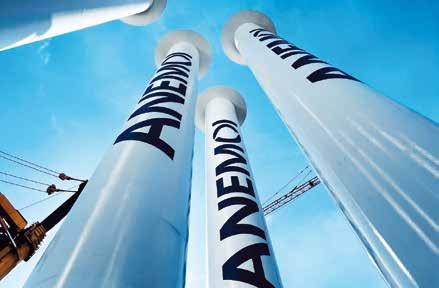
completed during routine docking, minimising vessel downtime and enabling efficiency gains from the very next voyage. By harnessing abundant wind energy, Rotor Sails not only help shipowners comply with tightening regulations but also deliver improved profitability, making them a practical and future-proof choice for sustainable shipping.
What do you see as the biggest opportunities for driving sustainability in shipping and how is your company positioning itself to seize them?
The biggest opportunities for driving sustainability in shipping lie in leveraging innovative technologies, renewable energy sources, and regulatory momentum to create more efficient, low-carbon operations. Decarbonisation is no longer optional, with existing and impending regulations creating a clear mandate for change. At the same time, rising customer demand for greener supply chains is creating a competitive advantage for early adopters of sustainable solutions.
Anemoi has been at the forefront of wind propulsion innovation since 2007, and we are proud to be approaching our 10th anniversary as an incorporated company. Our solutions have been successfully installed on some of the world’s largest and most important vessels, including the 400,000 dwt VLOC Sohar Max, marking the world’s biggest wind-propulsion installation to date. We are proud to partner with leading shipowners, particularly in the dry bulk sector, to accelerate their decarbonisation journeys. With a proven track record of successful projects and a range of Rotor Sails and deployment systems, Anemoi is ideally positioned to help shipowners harness wind energy
as the most effective auxiliary propulsion method for commercial vessels, driving both sustainability and profitability.
What sets your award-winning initiative apart as a model for the maritime industry and how do you envision its success inspiring similar efforts across the sector?
Anemoi’s Rotor Sails stand out as a model for the maritime industry by combining proven technology with modern production and installation techniques to deliver immediate sustainability benefits. Rotor Sails harness the Magnus Effect - an aerodynamic phenomenon - to generate thrust, reducing reliance on the main engine and cutting fuel consumption and emissions. While this technology has been around for over 100 years, it is now more viable than ever, thanks to advancements in design and installation.
Anemoi focuses on the practical application of Rotor Sails, delivering solutions designed specifically for vessel operations. Our unique modular, plug-and-play system enables fast installation with the option to commission at sea, shortening the time out of service. With minimal vessel downtime, our flexible deployment systems ensure cargo handling remains uninterrupted. Built for durability, our Rotor Sails feature a 25-year lifespan with very low maintenance costs, offering shipowners a reliable, efficient, and long-term investment tailored to a wide range of vessel types. Our decade-long collaboration with classification societies, design houses, vessel owners, operators, and shipyards has given us invaluable performance data, allowing us to continuously improve our technology performance, alongside the practical benefits.

The meeting point for the Greeks of Black Sea (Pontus Euxinus), Asia Minor, Constantinople, Cappadocia, Ionia & the Hellenism of Diaspora

Angus Whiston Communications Director
DeepSea Technologies' mission is to truly cut waste out of ship operations – a mission which has a radical impact both on the industry’s overall future prospects, and on the bottom lines of our clients.
More specifically, Angus Whiston, Communications Director, DeepSea Technologies Naftemporiki, «we’re now focused on providing owners and operators with a single solution to take their whole fleets from where they are today, through to where they need to be in 30 years. Every fleet has a mix of vessels – old and new, more or less connected, bigger or smaller –and technological solutions need to adapt to these fleets where they are now, rather than in a perfect future world of newbuilds».
DeepSea’s success at ESG Shipping Awards International - 2023 Ecoefficiency Leader Award, Bronze - is part of a revolution that the shipping industry is currently undergoing. It is not just digitalisation (although it is enabled by it) – it is a process of truly learning how vessels actually behave for the first time.
To what extent does the cost of transitioning to sustainable shipping impact profitability within the shipping sector?
The cost of the industry going netzero will undoubtedly be huge – over three trillion dollars according to Martin Stopford – and that cost will have to be borne by somebody. Who will ultimately end up paying for the bulk is, of course, still unclear – but the bill will likely to be split between many stakeholders.
Nevertheless, there are also opportunities – especially in the short term – to actually increase profitability (even while simultaneously investing in the technologies and processes that will ultimately get us all the way to 2050 and beyond). Whilst the conversation about ‘alternative fuels’ rages on, forward-thinking shipping companies are equally focused on improving operational efficiency – a vital step if the industry is to bear the highly elevated costs of new fuels.

The majority of shipping companies today are wasting well over 10 per cent of the fuel they burn every day through inefficient operations (routes, speeds, and equipment) – a crime for which they now pay double (once for the fuel itself, and once for the emissions they’re being heavily taxed on).
Decreasing this is a matter of focus and adopting smart technology – which already exists – and is somewhat of a “holy grail” in our collective grind towards net-zero. You can think of it as a sort of
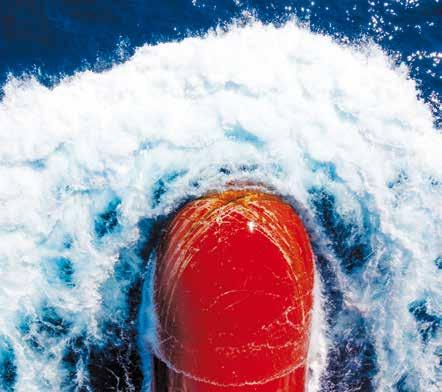
‘efficiency grant’ that technology has now given to every operator. Companies like Seanergy, Eurobulk and Wallenius Wilhelmsen have been harnessing it for years!
What are your company’s future ESG goals and how do you plan to ensure that they are both ambitious and achievable?
Our mission is to truly cut waste out of ship operations – a mission which has a radical impact both on the industry’s overall future prospects, and on the bottom lines of our clients. More specifically, we’re now focused on providing owners and operators with a single solution to take their entire fleets from where they are today, through to where they need to be in 30 years. Every fleet has a mix of vessels – old and new, more or less connected, bigger or smaller – and technological solutions need to adapt to these fleets where they are now, rather than in a perfect future world of newbuilds. Older ships require digitalization in one form or another… newer ships should be considering automation solutions to help minimise fuel consumption and crew workload. It is critical that an organisation like ours can offer operators a ‘blueprint for success’ –cutting waste fleet-wide, supporting energy efficiency & performance teams, and providing a vision for how tomorrow’s ships should look like.
What sets your award-winning initiative apart as a model for the maritime
industry and how do you envision its success inspiring similar efforts across the sector?
DeepSea’s success at these fantastic awards is part of a revolution that the shipping industry is currently undergoing. It is not just digitalisation (although it is enabled by it) – it is a process of truly learning how vessels actually behave for the first time. Ten years ago, almost no vessel operator had an accurate view of the performance of any of their ships – it was more of a loose ‘art’ than a science. Ten years from now, there will be very few companies that don’t have comprehensive behaviour models of their vessels functioning as the ‘single source of truth’ within their organisation. Or, put another way, shipping is moving from donkey racing (exhibiting a large degree of acknowledged randomness) to Formula 1 (as precise and scientific as you can get). Artificial Intelligence is one of the key developments that has ‘changed the game’ in both F1 and shipping – and we’re delighted to be a significant contributor to the former. The benefit of this ‘new approach’ to ship operation is very clear: better information means better day-to-day decisions (routes, speeds, and equipment operation), which in turn leads to lower fuel consumption and emissions.
NEWSPAPER OF THE YEAR

Dimitra Kourmatzi Head of ESG, Regional Compliance Officer EMEA & APAC
Survitec Group has highlighted the challenges of implementing a unified sustainability strategy across diverse regions due to varying local regulations. Dimitra Kourmatzi, Head of ESG, explains that Survitec empowers country managers to navigate these complexities while ensuring alignment with a global sustainability framework. The company has successfully integrated ESG practices into its operations, balancing safety and environmental responsibility. Through initiatives like the Global Health & Occupational Safety Team (GHOST), Survitec is fostering a culture of safety and sustainability, with employees actively driving positive change in line with global ESG goals.
Should regulations governing the transition of shipping to a sustainable future have global applicability to ensure fair competition and consistency?
As a business, we are bound to navigate regulatory requirements in the countries in which we operate. As a result, we do not have one overarching sustainability strategy that spans all the regions in which we operate. We equip and empower our country managers to adhere to their local or regional requirements. Implementing a unified Sustainability Strategy could be challenging for those businesses operating in sectors that perhaps lack infrastructure, forcing them to monitor changes rather than improving sustainability performance. However, global regulations would ensure uniform application of sustainability principles at both business and industry levels, leading to clearer, validated, and more efficient implementation.
Can you share some of the most significant challenges your company has faced in advancing ESG initiatives and the strategies you’ve used to overcome them?
ESG as a framework is a relatively newer notion than that of sustainability. With the birth of any new type of management tool there are always difficulties in incorporating it within core operations. Amongst other barriers businesses face are differing perspectives and expectations from their stakeholders and feasibility in terms of implementation, whilst at the same time aiming to ensure that their core business continues to function. Survitec has long embedded ESG practices within its various pioneering initiatives and we were determined to ensure that through our decisions and actions we kept in mind the legacy we leave behind. As pioneers of Survival

Technology, safety is our top priority but we are also committed to driving positive change to improve our processes and procedures. To ensure that our global business correctly evaluates and implements initiatives which are beneficial towards our environmental and social footprint, Survitec has empowered crossfunctional committee with its own Terms of Reference to retain an overview and implement a risk and opportunity management approach to ESG targets and routes to achieve them. The committee is made up of colleagues who are individually responsible for their business functions but collectively cover critical aspects of the business. Together, they are dedicated to creating suitable and effect objectives and goals which will set out Survitec’s direction of travel in the short, medium and long term.
What sets your award-winning initiative apart as a model for the maritime industry and how do you envision its success inspiring similar efforts across the sector?
As a global safety and survival solutions provider, safety is integral to everything we do. We have a Global Health & Occupational Safety Team (GHOST), which is an inclusive program responsible for promoting awareness, developing knowledge and skills, participating in risk and impact assessments, contributing to Health and Safety (H&S) Committee Meetings and participating in various audits to identify H&S concerns. The GHOST leaders are responsible for implementing and developing best practices from industry and
applicable group processes. The team serves as a periodical evaluation of the management system and process auditors, too. They identify any practical gaps and suggest applicable improvements. The programme combines two of Survitec’s strengths: our drive to ensure that safety is at the heart of everything we do and our colleagues lead this drive. By empowering our people to do what they do best, the Ghosts are able to be the eyes and ears to lead change. As they are internal colleagues they work alongside, for and on behalf of their fellow colleagues to ensure health and safety is everyone’s concern. Ghosts may be invisible but ours are certainly not.

